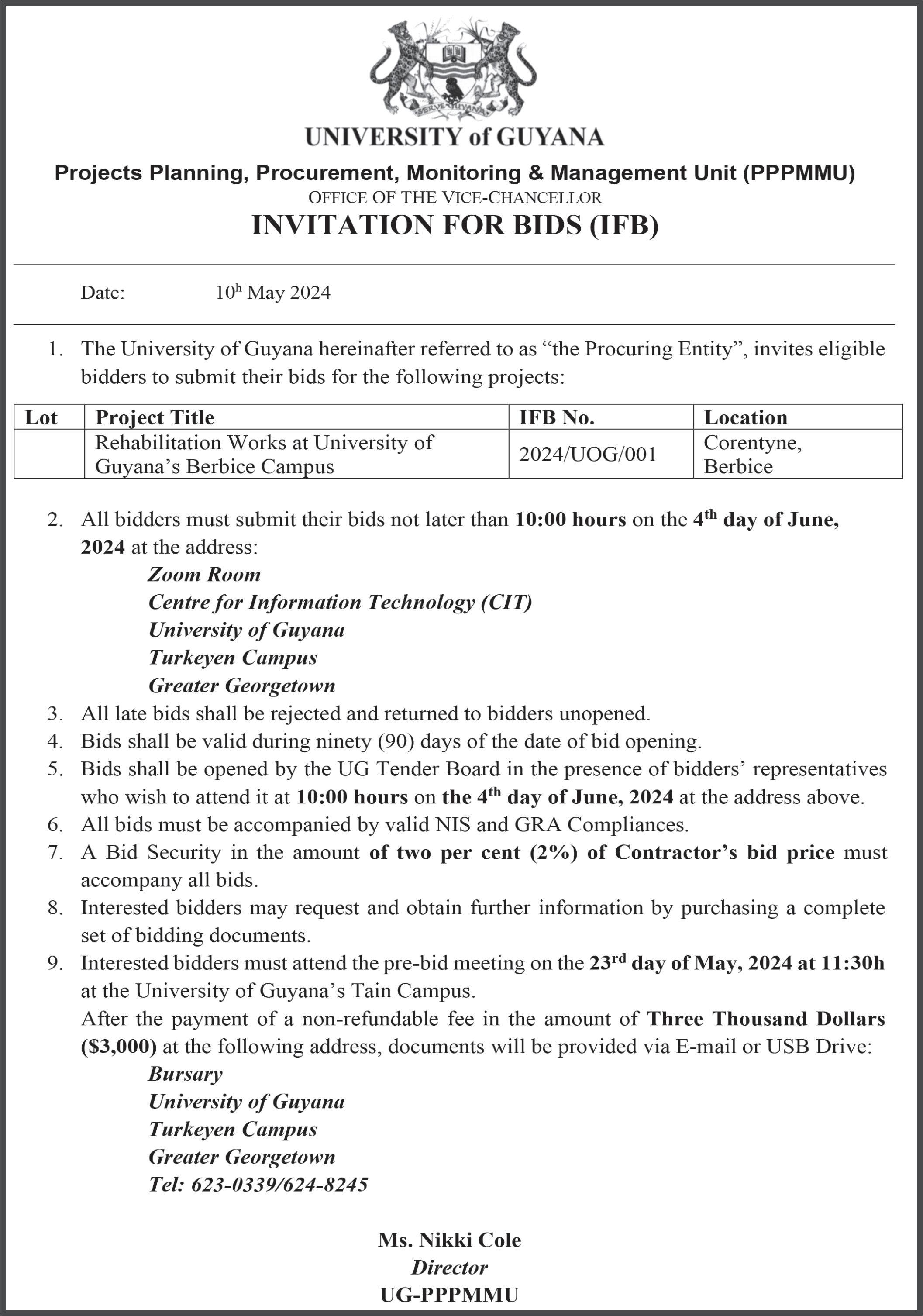Achieving the simple things
A mother shares her story of hardships and success
May 19, 2024



May 19, 2024


COFFEE lovers can now enjoy coffee with a little kick to it in the form of a coffee wine, a local product of among 20 wines being retailed in supermarkets and shops across the country.
John Luke is the face behind the innovative product, coffee wine. He hails from theJacklow community on the Pomeroon River and is an agro-processor who has a community-based business instead of a family-owned one.
Luke told the Pepperpot Magazine that where he is from, there is plenty of locally-growncoffee, and it was wasting away. Eventually, he thought of ways to utilise it and birthed the idea of coffee wine.
With his expertise, he played around it for a bit and decided to make it into
a wine - which has become of his best-selling products.
“It was with the thought in mind of doing more with coffee that I came up with the coffee wine concept, and after I mastered wine-making, I decided to give it a try, and it came out well. It is in demand, selling off like ‘hot cakes’,” he said.
Luke related that he had invested time to educate himself in wine production overseas, and with his culinary skills as a qualified chef, he knew he was ready to make things happen in terms of business.
He stated that his line of coffee wine is unique, of high quality and high standard, and he is exporting it mostly to the Caribbean.
However, customers in the US and Canada have since expressed interest in
buying, so soon, he will set up an online shopping outfit to accommodate those buyers.
Luke’s brand of coffee wine is available for sale at the Guyana Manufacturing Corporation (GMC) Guyana Shop on Robb Street.
The father of three told the Pepperpot Magazine that he is expanding his business into a 24-hour processing facility, hoping to employ more than 100 people, using a two-shift system.
Luke reported that he is presently land-filling the site at New Road, Pomeroon, earmarked as the processing plant,and will soon erect a fence, after which the building will be constructed, and he is seeking support in this aspect of his expansion.
The agro-processor not-


ed that when he started out, he had 15 employees, but today, he has three full-time staffers. He is renting a business place and the monthly
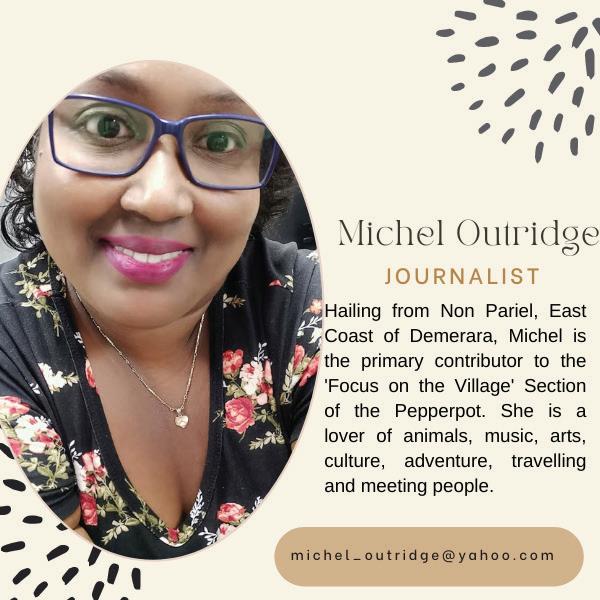
John’s brand of products,is a local agro-processing company which specialises in the production of condiments,hot sauces, powered seasonings, green seasonings, wines, jams and jellies, cake fruits and other products.
Luke has made great strides within the past 30 years of establishing his agro-processing business, which now produces 21 different products such as cassava seasoning, pepper sauce, cassareep, fruit and coffee wines.
He sources all raw materials, including fruits and all produce, from local farmers across the country under the farmer’s group called Pomroom.
fee is putting pressure on his production. As such, he is seeking to have his own processing factory.
Luke’s Manufacturing,
Of the 20 flavours of wines Luke produces, only a few were released for sale while the others will be on the market once his processing facility is in full
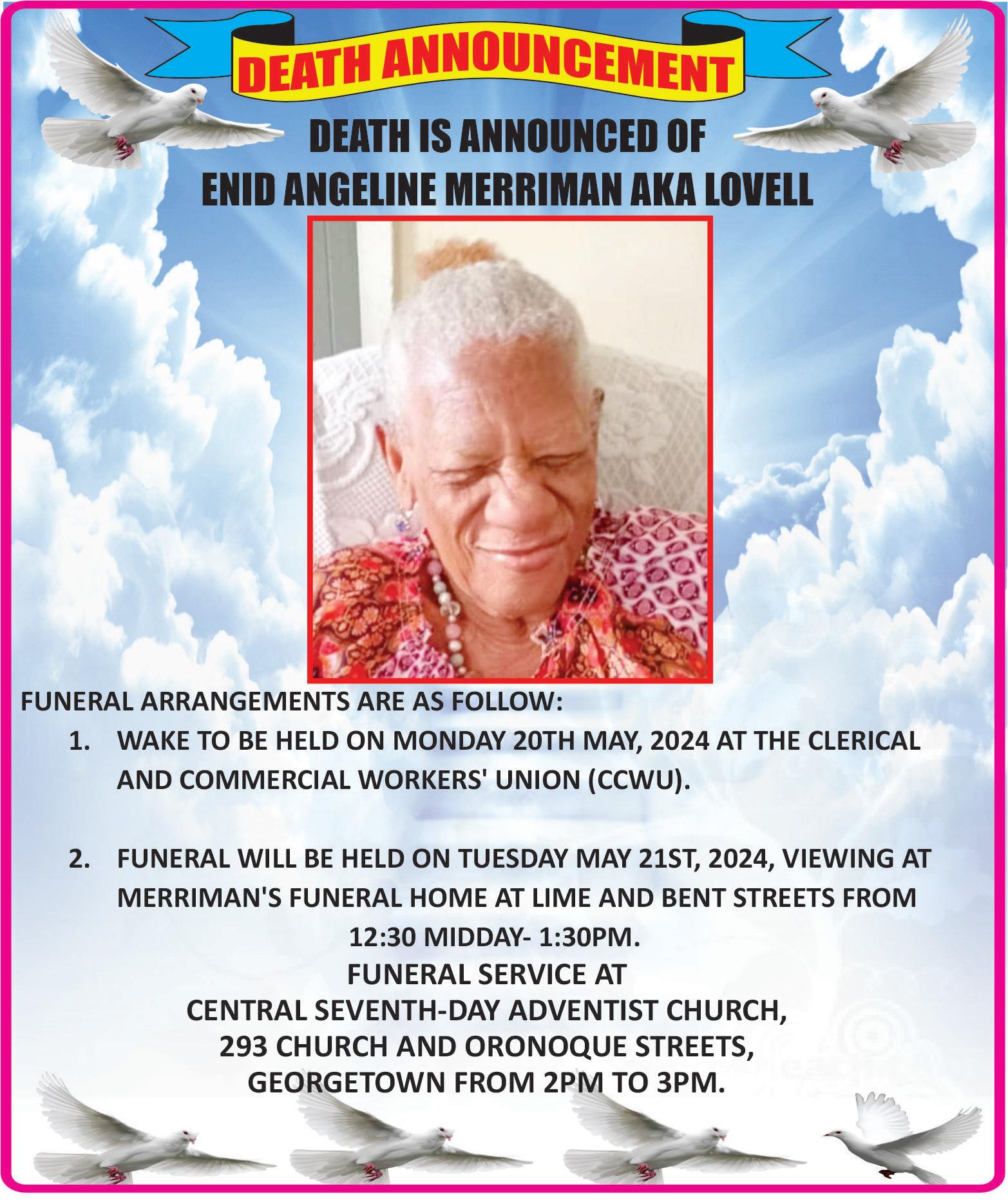
NARISSA Shawh, a henna artist and supplier, is perhaps the only person in the country who has developed an organic hair henna formula that helps many people with hair problems, such as dandruff and falling.
The 35-year-old of Enmore, East Coast Demerara, started working professionally with henna about 10 years now, but it all started as a hobby about four years prior. She had no idea how this would have turned into a rewarding business that
not only furnished her with an income but also provided great help to people using her products.
She started with body henna designs, doing it on brides and even having the pleasure of having First Lady Arya Ali as one of her clients. “I was self-taught. I had many years of practice, and I always try to improve the quality of my work so people can be happy and feel nice about what I have to offer,” Narissa shared in an interview with Pepperpot Magazine.

At the time, she found that no one was doing henna at a professional level, and he wanted to reach that point.
The hair henna, though, came by the way and would be what brought her the most rewards. When she tried it at first, having been dealing with hair problems, she saw how well it worked.


She’d add different herbs and oils for the hair along with the henna. “So I started mixing that. I wanted to make it available so people can benefit, too. I didn’t have any intention doing this although I knew the benefits. I didn’t really want to get into that, but after I found it was so helpful to me, I was like, I have to share this; I can’t just keep this to myself,” Narissa recalled.
The hair formula has been helping many people because Narissa said there’s nothing quite like it on the market. “There’s no fully natural hair dye out there. There is henna out there with chemicals in them. But I wanted to provide a fully organic product for people because when they use the other brands out there, they would still get the allergic reactions.”
Narissa is working towards developing herbal hair oil and masks as well. “I was always fond of art and designing, and I explored different art forms like cake decorating and stuff but they never caught my attention the way henna did. I loved doing it.”
She has done extensive research to get her formula going and sources herbs from India and other parts of the world.



WITH a highly taxing job as the Political, Press and Public Affairs Officer, Tiana Graham oversees the Foreign, Commonwealth and Development Office (FCDO) attached to the British High Commission, Georgetown, Guyana, where she is expected to be in the know at all times, the kind of challenge she likes.
She has been at the post for the past two years and six months, and the job has
prising young woman who pushed herself to become the best version of herself in many aspects of life to be marketable and get the job she always wanted.
She is a city girl with nine siblings, from a single-parent home in South Ruimveldt, and derived from very humble beginnings, where she could not even attend school five days per week like most school-aged children.
But despite challenges, she went to Central High School, then to St. Joseph
Guyana (UG) to pursue Communication Studies.
As she delved into the world of employment, her very first job was at the Georgetown Public Hospital Corporation (GPHC) as the confidential secretary to the Chief Executive Officer.
Whilst there, she realised she liked the media in terms of public speaking and relating to people since she was utilised to function as the Public Relations Officer when that person went on annual leave.
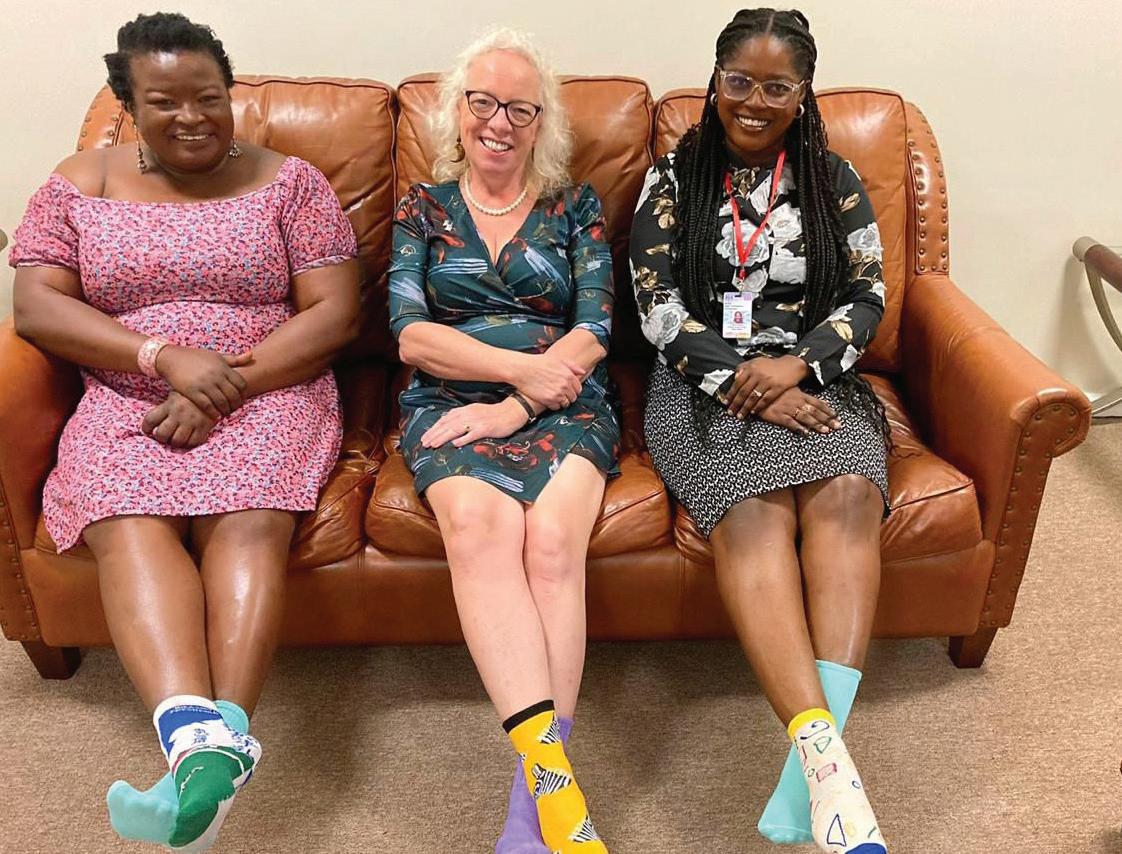
opened new doors and afforded her newer opportunities. Graham is a very enter-
High, where she was a student of fourth form and later went to the University of
Hence, she applied for a job as a reporter at Kaieteur News and was there

for eight months, after which she worked at the Private Sector Commission as a public relations officer for two years.
Graham told the Pepperpot Magazine that the job was good but pretty much routine after a while and that she was up for a challenge.
So, when she saw the advertisement in the newspaper, she grabbed the opportunity and applied for the job at the British High Commission.
She added that she received a favourable response and got the job. She was elated and knew she had to ‘be in
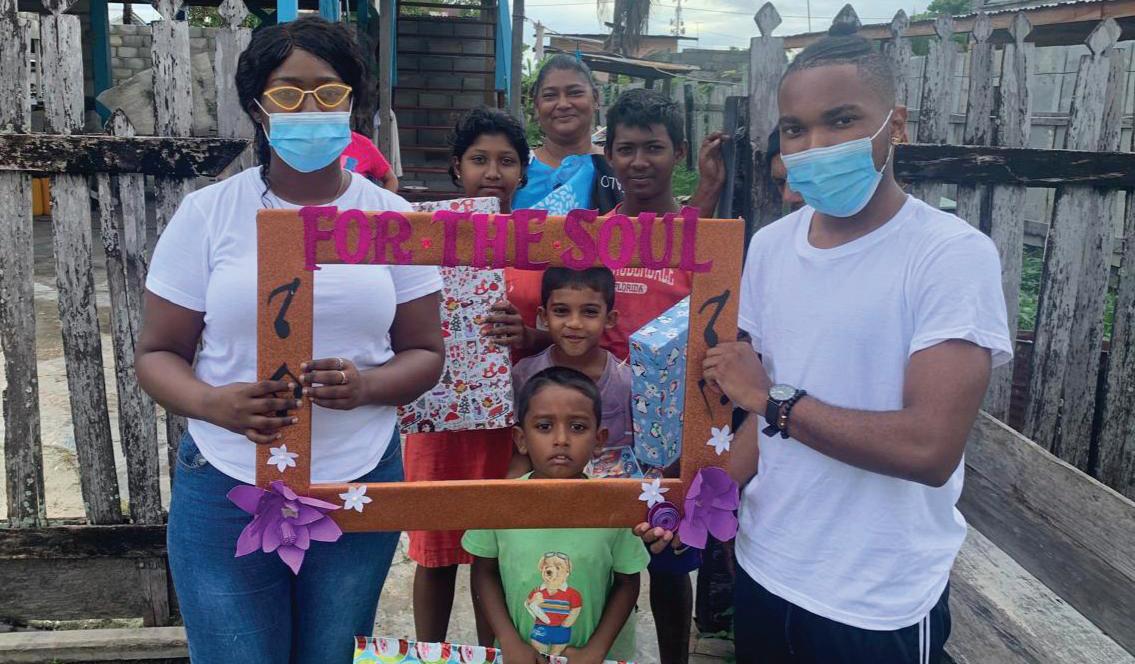
the know” to be effective and reliable at her job.
Graham reported that her job is multi-faceted and highly taxing, so she knew what she was getting into and would do her best to stay abreast with the news via the newspapers, social media, television etc.
“I would read the newspapers daily from front to back because you never know when something about the British government will come up, so being one step ahead is wise,” she said.
Graham’s job entails maintaining good relations with media, managing social media platforms, keeping updated on political trends, public affairs and other related tasks.
“This job has given me the opportunity to travel to nine different countries and I have met so much people and were able to connect so it is a stepping stone to build contacts,” she said.
Graham told the Pepperpot Magazine that she sees herself in the public diplomacy field and somewhere in politics, too, because of her love for both and as a humanitarian, she will always be passionate about human rights and volunteerism.
For the Soul
She is the founder of a Non-Governmental Organisation (NGO) “For the Soul”, in 2017, and they have a group of 12 members, which includes friends and asso -
ciates.
Graham is a passionate humanitarian who loves giving back to society through her organisation and has successfully hosted ‘Back to School” outreaches, Christmas hampers, and skills workshops.
Grounded in her roots and as a normal person, she always had a deep sense of wanting to give back and do something to support others who are going through less than fortunate times.
“My first project with the NGO was after a meeting we got together to host a Backto-School project, which was successful and that motivated me to keep going, I wanted to do even more. I wanted to create a safe space where people can express themselves without the fear of being judged,” she said.
She expressed gratitude to her parents and partner for their continued support throughout her journey to better herself and for every new initiative she cooked up.
Graham told the Pepperpot Magazine that at the office of the British High Commission, the team work and effort is everything she was hoping for.
She stated that even though the team is small, they punch their way above their weight and it’s all due to the sterling team effort that they can execute all of the British High Commission’s work.
GLOBAL Tours and Travel (GlobalTT-Guyana), a local journey and destination management company, says its focus is to provide complete travel logistics solutions to Guyanese travellers and expatriates living and working in the country, offering them all-inclusive tours and packaged vacations to new and exciting destinations across the world.
The company, led by Waynewright Orderson, said such destinations include the Caribbean, North, Central and South America, Europe, Asia, the Middle and Far
the conventional ports of call that Guyanese usually travel to, such as New York City, Toronto and London, GlobalTT-Guyana has formed alliances with tourism entities in places such as the United Arab Emirates, Mexico the Dominican Republic, Cuba and other Caribbean territories,” Orderson shared with Pepperpot Magazine.
And so, GlobalTT-Guyana said it has decided to give Guyanese a ‘taste’ of these territories through their food, drink, music, dance and culture. As such, earlier this month, the company held the inaugural Cuban and Latin
Georgetown.
The main considerations for putting together the event were consistent with the country’s thrust to integrate the Latino demographic into the diverse population of Guyana, to widen the scope of appreciation of other cultures and to introduce the stunningly beautiful travel destinations of Latin America to the Guyanese travelling public, Orderson shared.
Conservative estimates, according to him, have shown that there are approximately 30,000 Cubans, 50,000 Venezuelans and scores of other Latin Americans, including

East.
“And so apart from
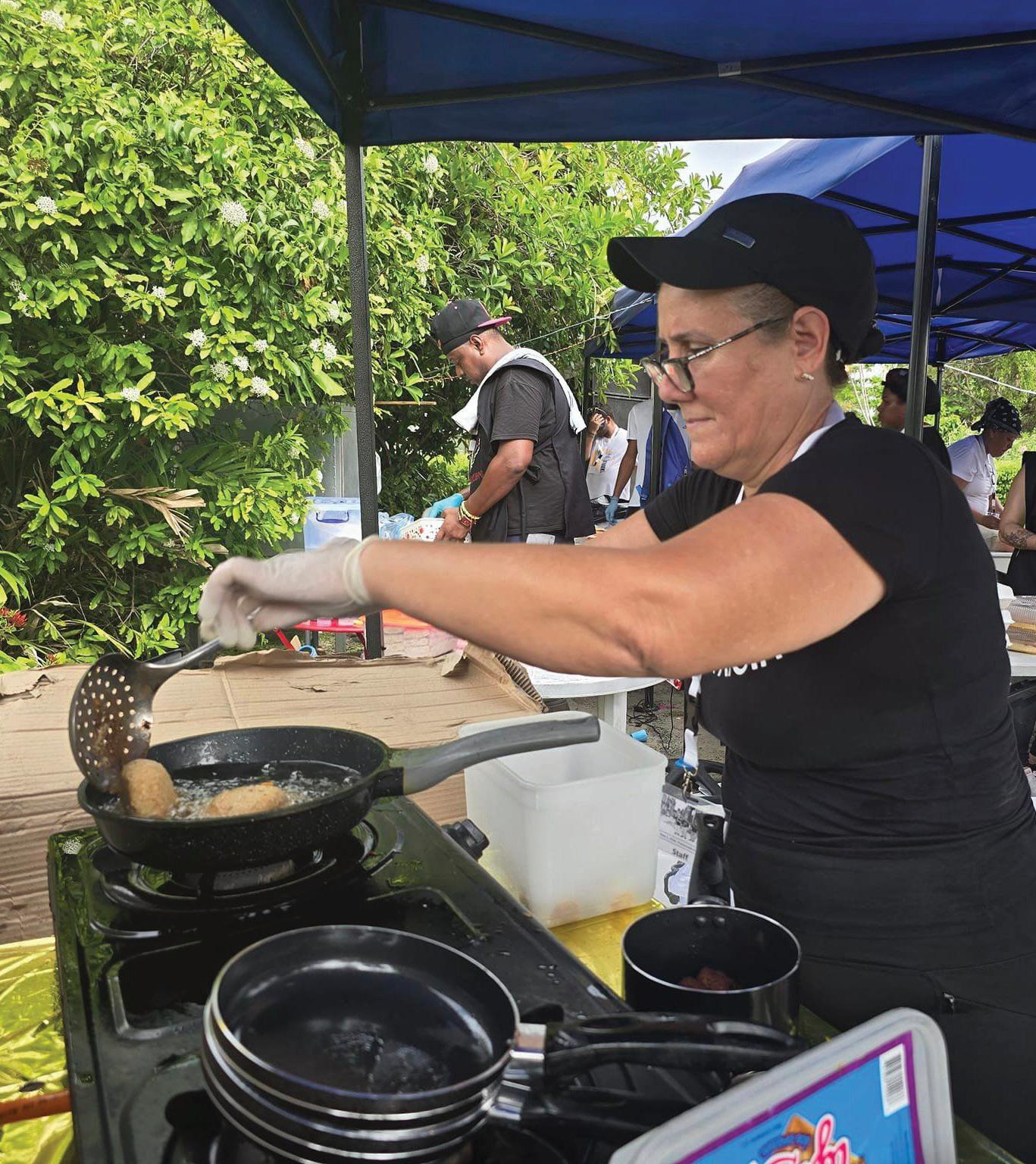
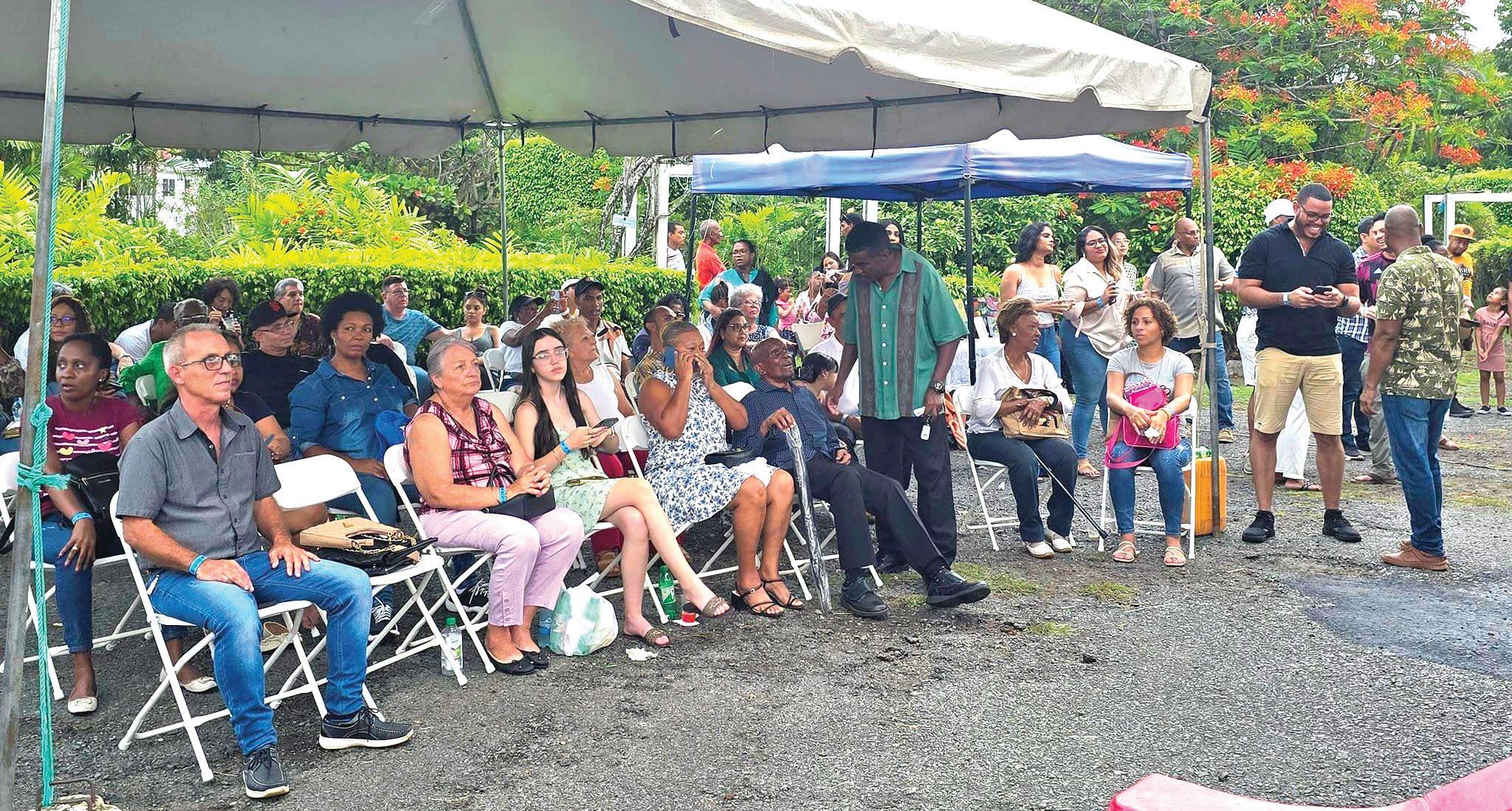

Brazilians, Dominicanos, Mexicans, among others in Guyana?.
Dubbed ‘Fiesta Cubana’, the vivacious celebration was a collaborative feat spearheaded by Global Tours and the Embassy of the Republic of Cuba in Guyana. The Local Organising Committee curated an immersive experience, embracing the diverse tapestry of Latin American culture while promoting sustainable tourism in Guyana.
“The event’s objectives were resoundingly achieved, introducing Guyanese attendees to the vibrant mosaic of Latin American culture, facilitating the integration of the Latino community into Guyana’s diverse society, and igniting the wanderlust of Guyanese travel enthusiasts for the alluring charms of Latin American destinations,” Orderson shared.
Attendees were captivated by a lineup of authentic
musical performances, commencing with renditions of Latin classics by the Cuban violin virtuoso, Amor Guirola
gaeton, Maria’s repertoire kept attendees on their feet.
Renowned DJs later took the stage, ensuring an elec-
Attendees were captivated by a lineup of authentic musical performances
lised their taste buds with an exquisite array of traditional delicacies, ensuring an unforgettable culinary experience. Coffee enthusiasts were delighted by Distribution Services Limited Company, the authorised distributor in Guyana for the world-famous Santo Domingo Coffee, offering samples of this special Dominican brew. Patrons could also relax in the ‘Chill Zone’ adjacent to the ‘Havana Bar,’ indulging in famous Latin cocktails crafted from world-renowned Havana Club, Barcelo, and Brugal rums.
Attendees marvelled at the craftsmanship of talented artists as they showcased an exquisite array of artworks, crafts, and souvenirs, offering a glimpse into the rich traditions and cultures of Cuba and Latin America.
According to Orderson, due to overwhelming

Machadoso. Following her was the headline act, the versatile and captivating Cuban songstress, Maria Rodriguez.
“From the infectious beats of merengue to the sultry allure of salsa and the pulsating rhythms of reg -
trifying ambience that kept revellers dancing well into the evening.”
Patrons embarked on a culinary journey through the heart of Latin America as renowned Cuban, Venezuelan, and Dominican chefs tanta-
demand and numerous requests for a second edition, the local organising committee has already commenced planning for the next installment of the Latin Festival.
THIS week, the Pepperpot Magazine went on an interesting adventure and stumbled into a captivating community. The community of Old Hyde Park is a smaller, lesser-known village in Timehri. Known more popularly as Circuit Area, the community is made up almost entirely of a single family. Over the years, however, a few people have ventured into the village to set up their own life. Whereas some simply settled among the village’s people, others joined the family, growing the village. Jamie Jones is a mother of three energetic boys. Born and raised in Annandale, Jamie first came to Hyde Park several years ago. Since then, she has become more a part of the community than she ever thought possible. She told the Pepperpot Magazine how welcoming the village is and how she and many others became a part of the picturesque Old Hyde Park.
Annandale is far away from Timehri, but the two communities do have their similarities despite the distance. Twentynine-year-old Jamie explained that both communities had an authentic and country aura to them. Wide expanses of forest and beautiful waterways characterise both villages. Her community of birth facilitated a happy upbringing, one filled with countless play days in backdams and nearby canals. As she stated, “Growing up in Annandale was really nice. The area was quite the same as here. I had a lot of fun playing and so on. I remember being with my friends; we would wait for the weekends to arrive because we could not go out when we had school during the week. Growing up there was fun.” This is not much different from the childhood her children are experiencing today in Hyde Park. Her three boys attend neighbouring schools but happily frolic among the trees and creeks of Timehri’s backlands on the weekends.
Jamie was led to the community entirely by faith. She came to the community after marrying her now-husband. Their love story is an interesting one. As she explained, it all began with a mistaken phone number. “I met my husband when I was still living on the East Coast. My friend at the time got a call from the wrong number. They started to talk, and she said he seemed like a nice person. She gave me his number, and we started to talk. We never saw each other, but we started talking over the phone.” Sometime later, the two young people met at an aunt’s wedding. After seeing each other for the first time,
they quickly fell in love and got married.
Still teenagers and a year apart in age, the young couple set out to make a life for themselves and their growing family. As much as she enjoyed living in Annandale, Jamie bravely moved to Hyde Park because of her husband. She still remembers her first time visiting the community. She was captivated by the natural beauty, but she had her fears as a young mother so far from home. “This place has a lot of trees. And we did not have this many people. More people have moved in since then. But it was quiet, and I liked it.” In the years she had called the village home, officially since 2012, the village has developed tremendously. As she stated, “We never really have many problems. We never had issues with people coming in and invading our homes or anything like that. But now the community has developed a lot, and now we are getting roads.”
The community welcomes the changes. Jamie is just one of many people who are happy with the recent developments, and they are hopeful for further change. As it is, the community is well-equipped with electricity, and some villagers draw water from natural springs below their homes. Both Jamie and her husband work to provide for the family. Whereas he works in



various regions in Guyana, Jamie works in Soesdyke. “My husband is a mill operator, and I work at King and Queens in Soesdyke. My husband moves a lot, though,” she said. Jamie and her husband are working to build their little family and are happy in Hyde Park, surrounded by supportive family and friends.
Throughout her years in
the community, Jamie says the only constant thing is family. It would seem as though Old Hyde Park is the perfect place for families. Countless people have come from all across Guyana to build a life in the little community by the racetrack. Jamie says Old Hyde is unique in how closeknit it is. People of the community have fostered a truly unique and immensely strong sense of togetherness. Jamie explains that the community is best described as one big happy, helpful family: “Almost everybody here is family. We have the Davemons, the Diablos, and the Andersons. Everybody is an aunt, cousin, or in-law. And everybody helps each other.”

OLD Hyde Park Timehri is a little community with a twist. Comprised almost entirely of one family, Circuit Area, as it is also called, is as close-knit as could be. It also had the most humble beginnings, with its origins coming from the wake of tragedy. Not many communities could have taken root and grown like Circuit Area did. Today, the little village that housed a single family has blossomed into a well-established community. A major part of the community is Apostle Paul Anderson. As the resident religious leader of Circuit Area, Paul has made it his mission to help the people of his community. His story is similar to that of the community’s. Growing up was not easy for Paul, and in a life full of challenges, Paul said the only things that saved him were a few good decisions. Although adversities persisted, so did the resilience of Paul and his family. His story began rough beginnings that led to bad places. He described his youth and memories of losing many classmates to substance abuse and many other issues. And it seemed like he, too, was destined to
go a similar path. But Paul found his saving grace in his faith and the experiences that changed him. As he shared, “That experience that I had with Jesus Christ had totally revolutionised my life and changed me completely. Because in this community, many of my peers died very young because most of them were into weed, cocaine, and all different types of drugs and the abuse of drugs. And I too was following on that very path until my encounter with the Lord at the age of fourteen.”
Despite the challenges, Paul remembers the beautiful moments of his childhood and early life. He found solace from the noise of the world in the forest that surrounded Hyde Park, and very soon, the long travels to school became a way of connecting to all that was around him. As Paul shared, “If you’re a person that loves nature and loves bonding with nature, this is the place to be. I have been schooled at Hauraruni All-Age School, which is now a secondary school there on the highway. It is about ten miles away from here. And so my upbringing here has been a wonderful one.”
Over the last two decades, Paul has taken up
the religious mantle and has made significant steps towards developing his community. As he shared, “Presently, I am functioning here as the resident pastor in this community.
And we are doing wonderful work here in the community. We have a feeding programme that we do monthly. We cater to the youth, and we do so many different charitable works here. In addition to that, I travel the length and breadth of the Caribbean, taking the message of Christ.”
Apart from the Gospel, Paul preaches the importance of good choices regardless of the situation and the importance of not letting your surroundings shape who you are. “I tell people we are generally a product of our environment, whether we like it or not. But the decisions we make will determine who you are.”
Although he is a religious individual himself, Paul stated that not everybody has to make the choice he did. But speaking to youths specifically, his message is to find something good that interests you and keep at it. As he shared, “They can make a simple decision as pursuing something that they enjoy,

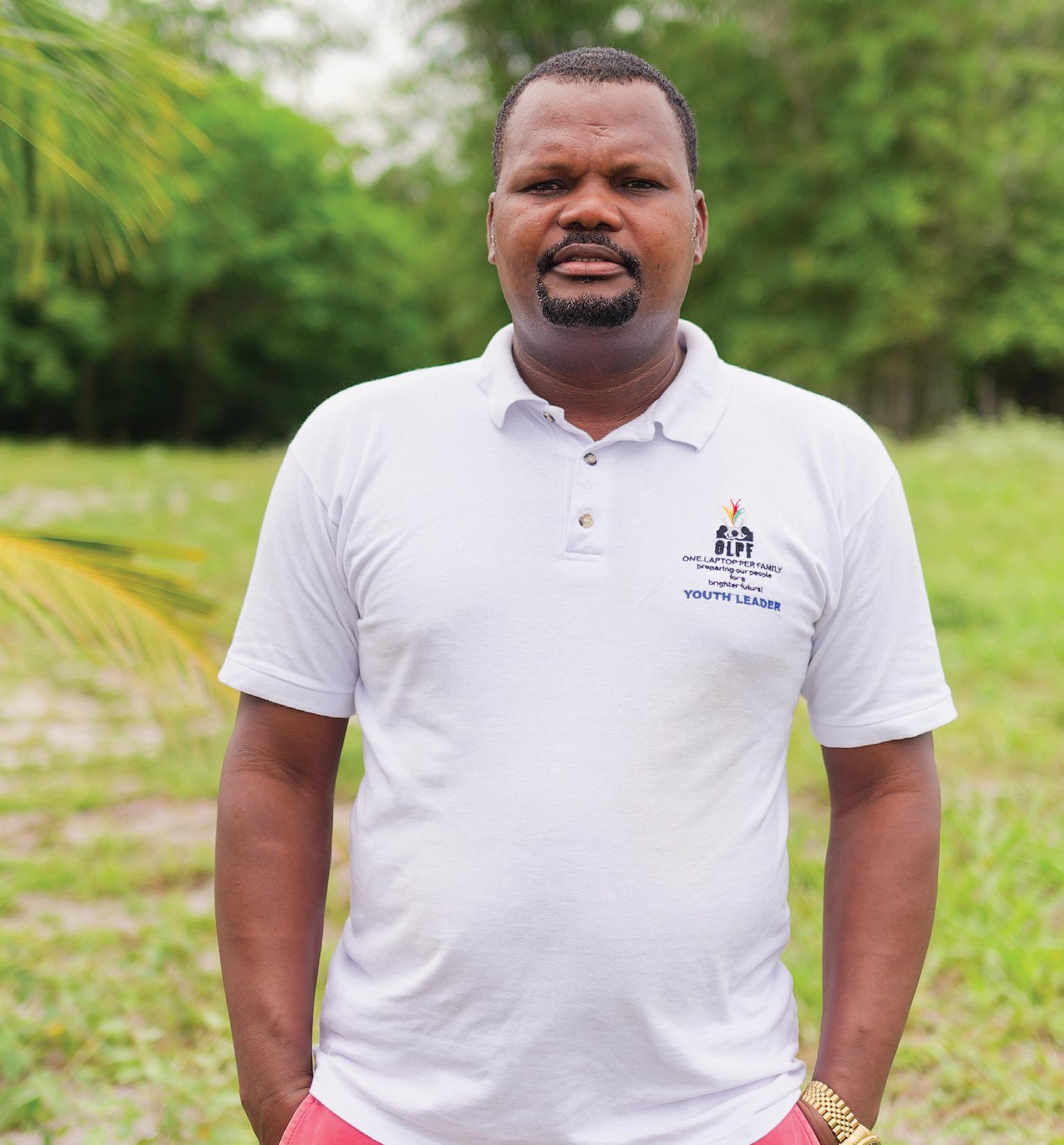
sports for example. Some sports that they love, cricket, there’s football, there’s boxing, there’re so many different sports that one can pursue.” A product of his close-knit community, Paul is also an activist for unity. With his emphasis on the nation’s young people, Paul also urges others to see the role unity plays in development. As he shared, “What I want to say to this nation is that our motto clearly states that we are one people, one nation, one destiny. If we’re
going to become all that God has called us to be as a nation, and we are going to maximise our abilities, we have got to truly unite.”
He further exemplified that together is truly the only way to move forward, stating, “And as our motto says, ‘one people, one nation, one destiny.’ Truth be told, divided we fall, but united we stand.” Paul’s message to Guyana is simple: unite. Coming from a little community where togetherness was the only
way forward, Paul firmly believes in the words he preaches. “My message to this nation is to unite, let us work cohesively, that we might accomplish a common goal. And I believe that all of us want to live in a Guyana that is free from violence. All of us want to live in a Guyana that is progressive, that we can call home, and that we can be comfortable in. And if we are going to do that, then we must unite. So I want to say to Guyana, unite!”

TUCKED away at the intersection of the Cheddi Jagan International Airport, the Guyana Meteorological Centre, and the ever-exciting South Dakota racetrack is a community known simply as Circuit Area, although its official title is Hyde Park. The community houses about 15 homes and fewer than a hundred people. But unlike most communities in Guyana, Hyde Park takes the meaning of neighbourly love to new heights. Hyde Park has a very unique yet captivating beginning.
It is quite literally an entire village made up of family members. Close to four decades ago, a home was destroyed on Laing Avenue, leaving a family of close to 15 people homeless. Left with nowhere else to call home, they settled with another family member in
ruins of disaster, the family has rebuilt their life in their very own village.
Some 40 years ago, Hyde Park was not what it is today. It starkly contrasted to the beautiful homes, surrounded by lush, well-kept greenery. Nadira Davemon came to the community when she was just 17. Her family of seven sisters remembers seeing the circuit for the first time and the little home they now called home. The community was home to a dense assortment of plants and wild animals. The foliage hid their little house well. As she shared, “We used to live in the West, then we moved to Laing Avenue, where there was a fire that burned down the whole range. And we had a family member living up here, and they invited us to come up here. “
Nadira explained that life in the community was like life anywhere else; the community had its own chal-
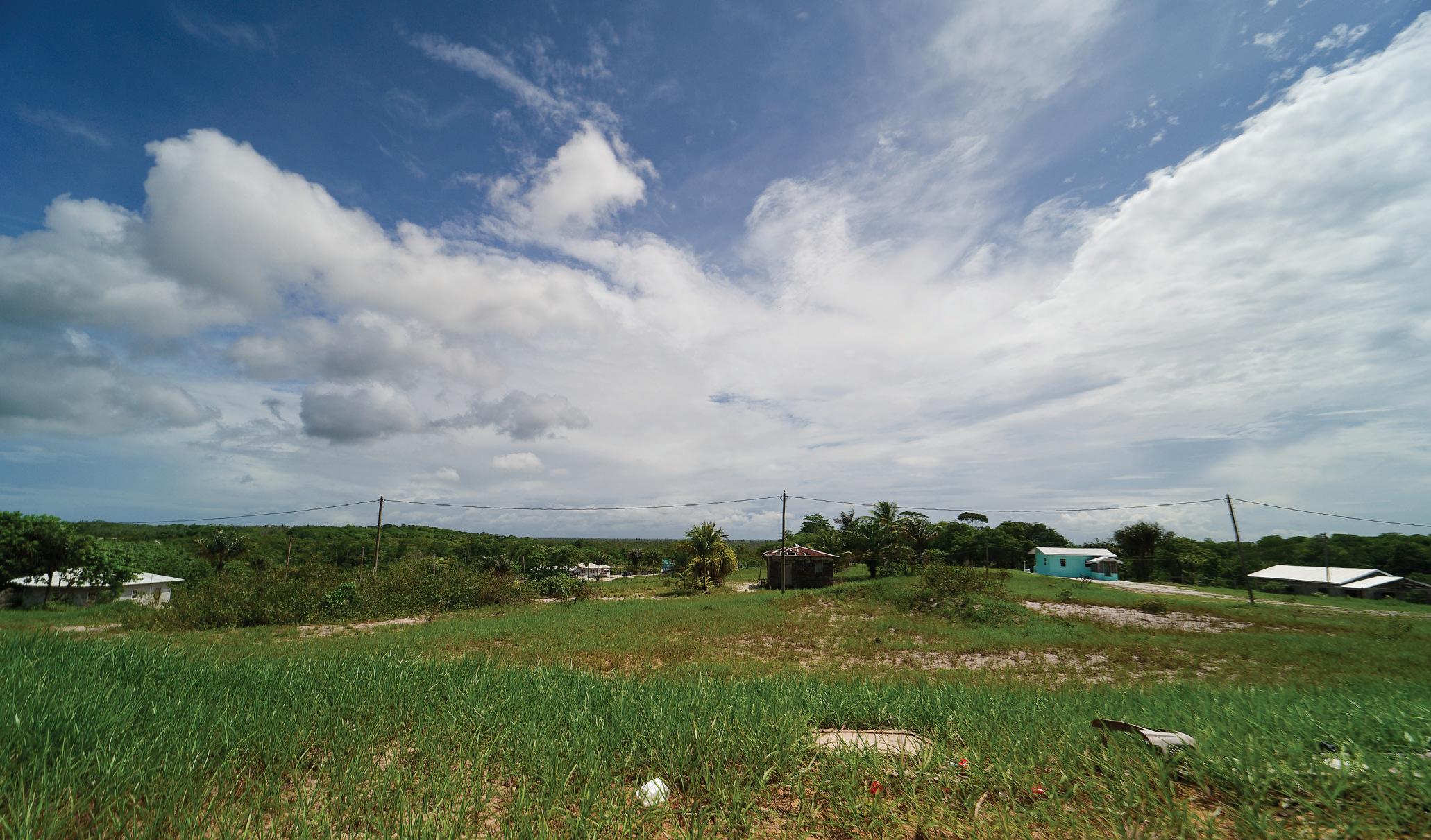
pointed out that three generations of people have called Hyde Park home, referring

Hyde Park. Since then, the community’s people have made a home for themselves, with brothers, sisters, aunts, uncles, and cousins all setting out to make a home in the same community. Today, Hyde Park is a family community. Stepping out of the
lenges and adversities to overcome. Over the years, the family branched off, each with their own family and home. Interestingly, they opted to stay together. Brothers and sisters set up homes together and raised their families side by side. Nadira
to her twelve grandchildren. Nadira is among those in her family who spent all of her adult life in the community, travelling to school, finding a job, and growing a family of her own, all done in Hyde Park.
Sharing the trials of her

marriage, Nadira said she became a mother young and got married even younger. As
Nadira describes the relationship she had with her husband as turbulent, but she
persons of the community work outside, with different professions. Because of its unique location, one of the

she shared, “I got married at a very young age; I married at eighteen. At the time, my husband used to work at the airport, the police, and then he left them and started working in the g bush. I used to live somewhere else right in the Hyde Park, and then we moved here. So from over there to over here.” Nadira spent many years married to her husband and raising their seven children. As she stated, “It wasn’t easy raising seven children. I went through a lot with my husband. I couldn’t take it anymore after they started growing up. So I’m glad when I came out of that relationship. I went to work, and since then, I’ve been working.”
stayed for more than a decade for her children. Today, her children are adults, and whereas a few have stayed in the community, several have left the community for their own new beginnings. Nadira says she is happier these days and especially happy with how her children have grown, with each having good jobs and beautiful families.
Nadira and the few others that make up the community of Hyde Park have adapted well to their new home. For many years, the community depended largely on farming. After the age of agriculture came to an end, many of the people pursued different jobs and interests. Today, most
village’s unique characteristics is the noise. Sitting between an airport and a racetrack, most people would find the almost constant noise an issue, but Nadira says they have grown accustomed to it, and the children born in the community seem not to notice the sounds of planes taking flight. As she stated, “ You just get used to it. The noise doesn’t bother their babies. They’re born used to it. When the cars go around with the noise, we get used to it.” Nadira admits that the community still has many challenges, but it is still a beautiful place to call home, a community full of love, serenity, and family.
MANY people may consider family achievements as the simple things - getting through tough times and sending the children off to school. But the people of Hyde Park, also known as Circuit Area, bring a whole new meaning to family bonds. Hyde Park rests in what most may consider the centre of chaos amidst an airport and a racetrack, yet it is still one of the most serene places on earth. The village has propelled itself to the beautiful, peaceful existence it is known for today. The villagers say at the beginning the community was nothing like it is today - a captivating suburban neighbourhood whose homes blend into the pleasant greenery it is surrounded by.
Sonya Davemon is just one of the community’s oldest inhabitants. Sonya and her family moved to Hyde Park when she was still a young mother to two small children. Without their father in the picture, it was a courageous decision for Sonya to raise her children amidst the challenges the budding village presented. She remembers the early years and the seemingly constant
strain the family was under. Sonya recalls the work and worry it took throughout the years to get her where she is today. As she stated, “I had a really rough upbringing. As the family grew and everybody got bigger, the family scattered. Everybody started pulling and tugging. We all used to live in one little house together. It was rough. And then I had my two babies, one-year-old and two-yearold- children, so it was rough for me, and I was the only one; my children’s father was not in the picture.”
One of the biggest challenges was the schooling aspect. It took many long hours of walking for Sonya’s two children to get to school in the neighbouring Hauruni. She remembers the difficulties the family endured in changing for the better. As she shared, “My children used to walk the trail to get to school. I bought two BMX bikes for them to ride straight out of the road and up the highway to go to school.”
Sonya explained that many people questioned the family’s choice to move to the then-thick forest, but at the time, Sonya said the family did not have a choice. “We did not get back our house, so we ended up in the Palms living. So my aunt lived here,
doing her farming and so on. And she said, ‘No, no, no, come up here and live.’ So we used to cram into her little house, and then we started branching off.”
Sonya also remembers the little wins the family achieved and how, little by little, things changed. She worked tirelessly to send her two children to school, wanting to give them an education and a better chance in life. Although there were challenges, Sonya and her family made it their mission to come out on top. As she stated, “It was really rough. And then I had to wait until my children grew up a little more, and then I joined the prison service, and I worked there for several years with them.” The prison service may not have been the first choice, but Sonya saw it as a chance to help her family after her children finished high school. “My time in the prison service was okay. We had no problems because it was an opportunity for me to help my family,” she said. She spent almost a decade in the prison service, and during those years, she moved through the various aspects of the profession. And in a job characterised by its violent offenders, Sonya said she met some nice peo-


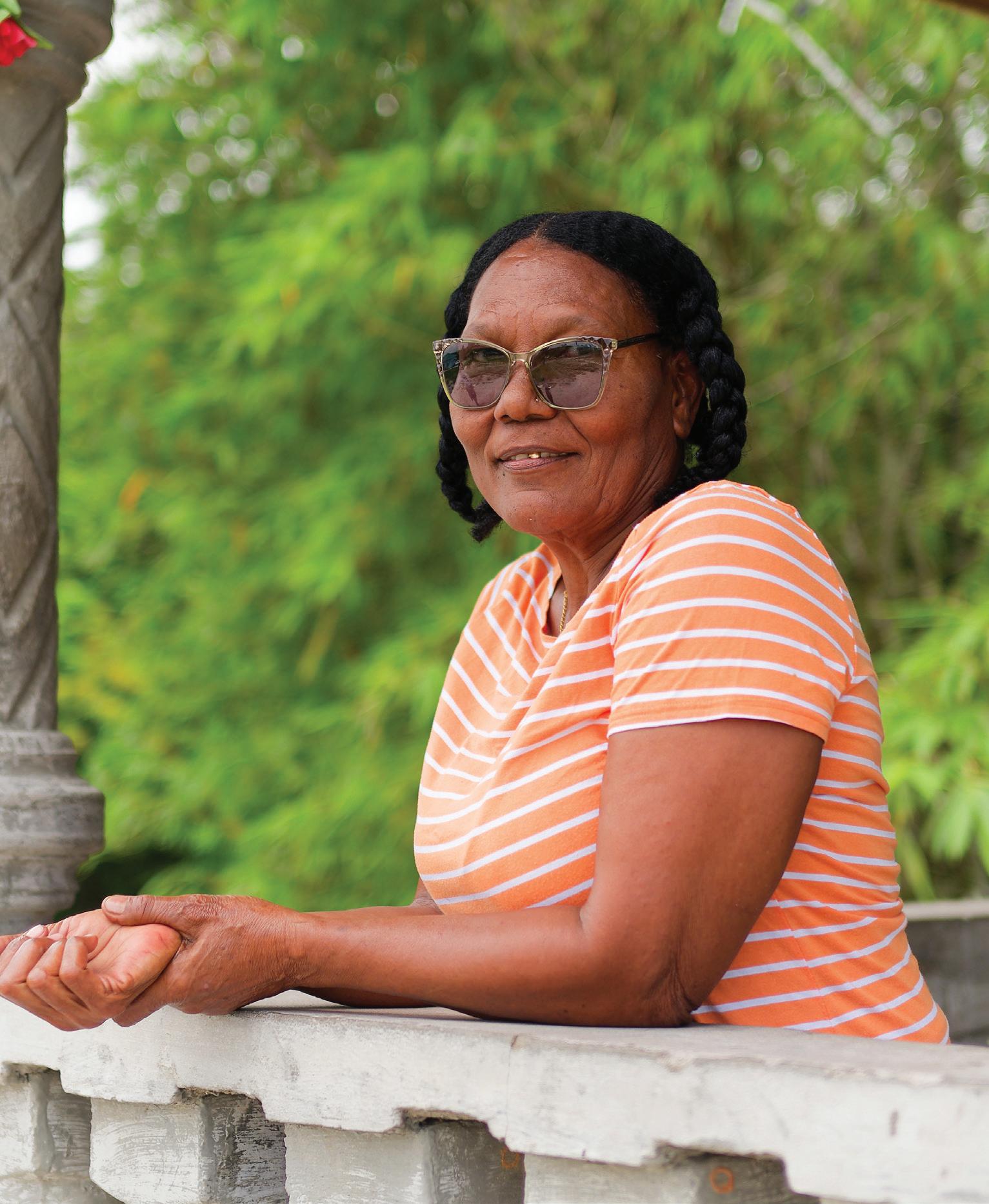
ple, many of them inmates. As she said, “The prison service was nice, for me, it was okay. At first, I worked as a custodian for a period of time, like a year, and then I eventually went up to monitor them. We have this big monitor where we can see every area of the prison, so that was my job up there. I had to monitor and see what
was going on and make a report. The inmates were nice to me and always respectful. I never talked to them in a bad or harsh way, and to me, they were nice. I did that for nine years.”
In the more than 30 years Sonya had called the community home, she has seen her children grow into brave, beautiful, and
successful adults with their own families. She is proud of the family’s progress and is adamant that it will continue. As she stated, “I feel good about the progress the family made because everybody tried to go on their own, the best way they can, to make their own family and build their own place and family.”




MY mother and her tribe are from Georgetown, Werk-en-Rust, and my father was born in Bartica. His tribe is wide: Bartica, Buxton and Georgetown. After the rumble and tumble of their separation, I can’t complain. I got a reasonable deal. I grew up with my godfather and his wife, my godmother, on the East Coast until their
passing. My siblings went to folk in Georgetown; some went with her when mom left the country. I can’t account for what transpired everywhere, even if I knew I wouldn’t write about it in this column. Cause, it ain’t nobody interest. It’s just the introduction to a sad incident that unintentionally led to a positive influence.
I lived with my godparents next to a family of three on the coast at Mahaica. I had just started school. Back then, starter classes were called ABC and there were ‘lil’ ABC and big ABC. I may have even been in 1st or 2nd standard when an unusual thing happened. I was attracted by what seemed to be a quarrel next door.
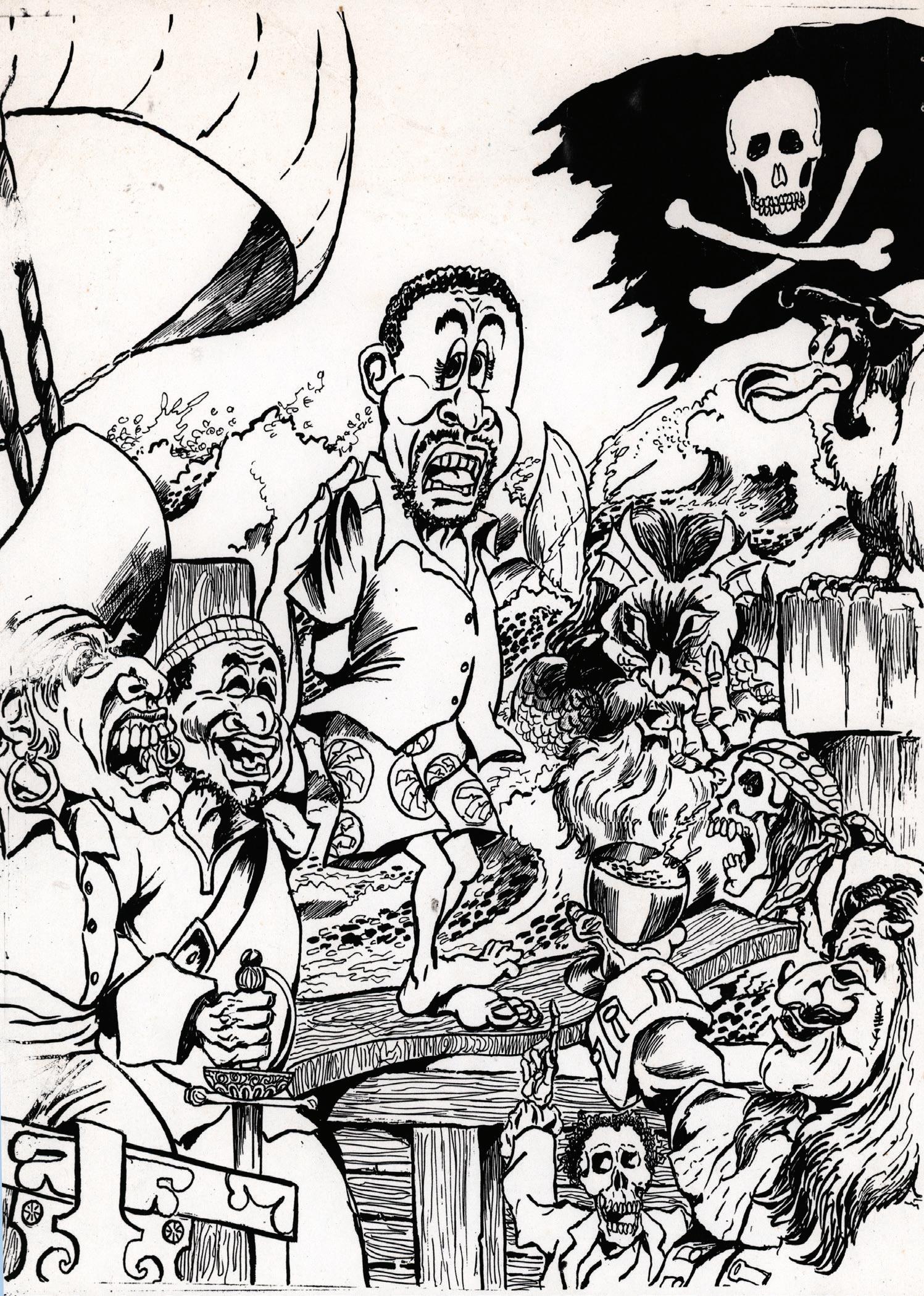

Though training insisted that I should not perch myself on the window to mind other people’s business, I looked out because the young lady next door often walked me to school and, though older than I was, listened to me, shared jokes and looking back within all innocence, was kind of my first girlfriend. So I stared as her step-grandfather, Sonny, was throwing her school books out of her bedroom window. I was transfixed, so I quietly stepped downstairs, tip-toed over and began to pick up what I knew were her reading books. They had burgundy red covers, ‘Nelson Readers’. I looked up and quietly called her name, “Sheila.” The blind was moved. She was crying, and I asked her if I could bring the books upstairs. She replied “No,
Barry, You take them,” and I heard Ma calling me, so I hurriedly tip-toed up the back steps with my treasures.
One of the books fascinated me more than the others, and I think it was Book 5. There was a chapter that covered the story of ‘Port Royal’ 17th century Jamaica, and a telling painting that accompanied the chapter sank deep into me. Of course, knowledge of Morgan the Pirate and piracy was active in movies and books we read back then. My godparents encouraged me to read and to experiment with my watercolours. It was pure experimentation without tutoring, around my First-Standard days. It took me years to understand the tragedy I had witnessed. Sheila left the area first. I know she got married, and I left after, and
I never saw her again. It was in the mid-1990s that Port Royal came into focus after the Jamaican comedian Oliver Samuels came to Guyana at the National Cultural Centre. I was part of the support for the local team, and so far, I trusted the promoter enough to suggest to him a graphic concept I was playing around with for some time, that would include Oliver Samuels. He was supportive and excited but needed to know how long it would take. I told him several months. He didn’t issue an MoU, so I developed one, in both of our interests, and I told him he would have to deal with Oliver’s blessing of the project when the time came. We agreed, though he didn’t sign the MoU.


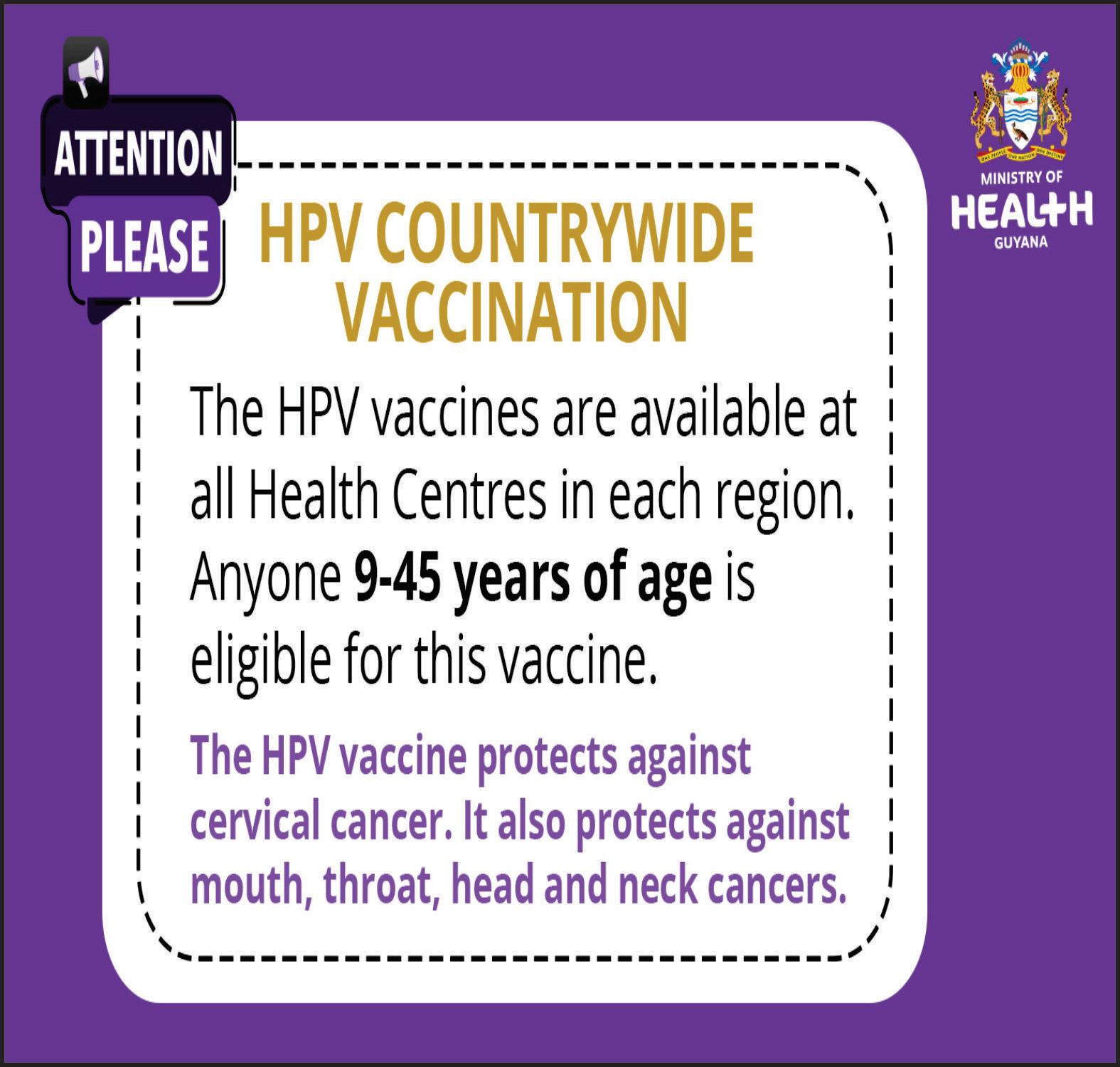
















This is a continuation of the first part of the story published in the April 14, 2024 Edition of the Pepperpot Magazine.
LIFE had continued in those struggling times, days still rough on the edges because there were times he had to work different jobs in far-off areas. He had never worked far away from home and was bound to the sea, but the pay was attractive, and he took it to fix his boat.
A new thought had also crossed his mind about something, and he wanted to pursue it. Six months later, he felt things were looking better, for his boat was now seaworthy and he could go out with a two-man crew. He cut his hair, had a clean shave, wore new clothes and shoes, and went down the road on a Sunday morning. Villagers passing by down the same road turned to look at him in surprise, and a few called out to him.
“Lookin’ sharp deh, bai!”
“Yuh gat ah date, budday?”
Ramesh just raised his hand casually and smiled. He reached the house where he was heading and called at the unlocked picket gate. She was standing at the end of the small garden, drying her hair. It was the first time seeing her with her hair down. She had long hair
She turned and looked at him in surprise. Her hand paused in towelling her hair.
“Well, well, look at yuh.”
He smiled slightly at the admiring look in her eyes, sure she was not teasing


him and said to her, “Yuh got beautiful hair.”
She smiled, finished towelling her hair and started to say something but before she could, he said boldly, “Ah come fuh see yuh.”
The subtle change in his voice caused her to look at him a little puzzled.
“Why?”
He could smell the floral scent of the shampoo in her hair, a scent which intoxicated his senses and he inhaled deeply before answering her, “Ah wan tuh ask yuh---”
Shanti’s father, calling from the house interrupted him, “Who is duh man and wah he want?”
“Is Ramesh!” she answered.
“De fisha man?”
“Yes, Papa!”
Ramesh greeted Shanti’s parents and sat down whilst she went upstairs to comb her hair.
“Suh wah bring yuh here?” the father asked.
Ramesh smiled a little nervously, and after a short moment, he answered, “Ah come fuh ask tuh marry yuh daughta.”
The mother and father looked at him, somewhat taken back, and the father said, “We ah poor people and we prayed fuh she marry somebody well-to-do so she could have ah betta life.”
“Yuh ah also wan poor man, Beta,” the mother said apologetically.
Ramesh smiled wryly, “Ah hoping fuh tings tuh get betta.”
“How?” the father asked bluntly, “Yuh got wan ole house, ride ah old bike and own ah boat dat does bruk down steady.”
“Ah will wuk harder,” he said on a promising note.
The father shook his head and said in a matter-of-fact tone, “Meh daughter sell food on a bicycle fuh she livelihood and if she marry somebody poor, she gon have tuh continue do dat.”
Before Ramesh could respond, Shanti came down the stairs slowly. She had overhead most of what was
Upon completing the project the following year, I travelled to New York and carried the artwork. I left it with him in Harlem and returned two days later. He was not at his business location but asked me to wait. This brother arrived and mournfully enquired, “You copyrighted it ?” I responded, “Yes, what’s wrong with that?” he complained that he went to a pal at DREAMWORKS, and he said that it was copyrighted. I concluded that I came up with the Idea, I scripted and illustrated it, and the next natural step was to register it. Well, we didn’t publish as planned. We did start with a one-1 plan, but when we parted, though we stayed in touch, I remained with the original plan. However, the brother went through some other portal and ended up with another objective.
FROM PAGE XI
The lesson of this article is twofold: watch your back legally. But the most important reality is that a little boy obtained a school book beyond his age that he would have never read in school, and as a grown man, brought into being a concept inspired by that significant chapter he read. With the painting that accompanied the true but tragic story of ‘Port Royal.’ Then, from the mental records of memory. With a desire to make it live beyond its tragedy, some 300 years later with less of its horror. Perhaps it was too tragic to be interpreted otherwise, but the memory invoked the child’s enquiry, and the man made the book live, if just for a mysterious beginning, to be put aside until another day; such are the mysteries of the mind.




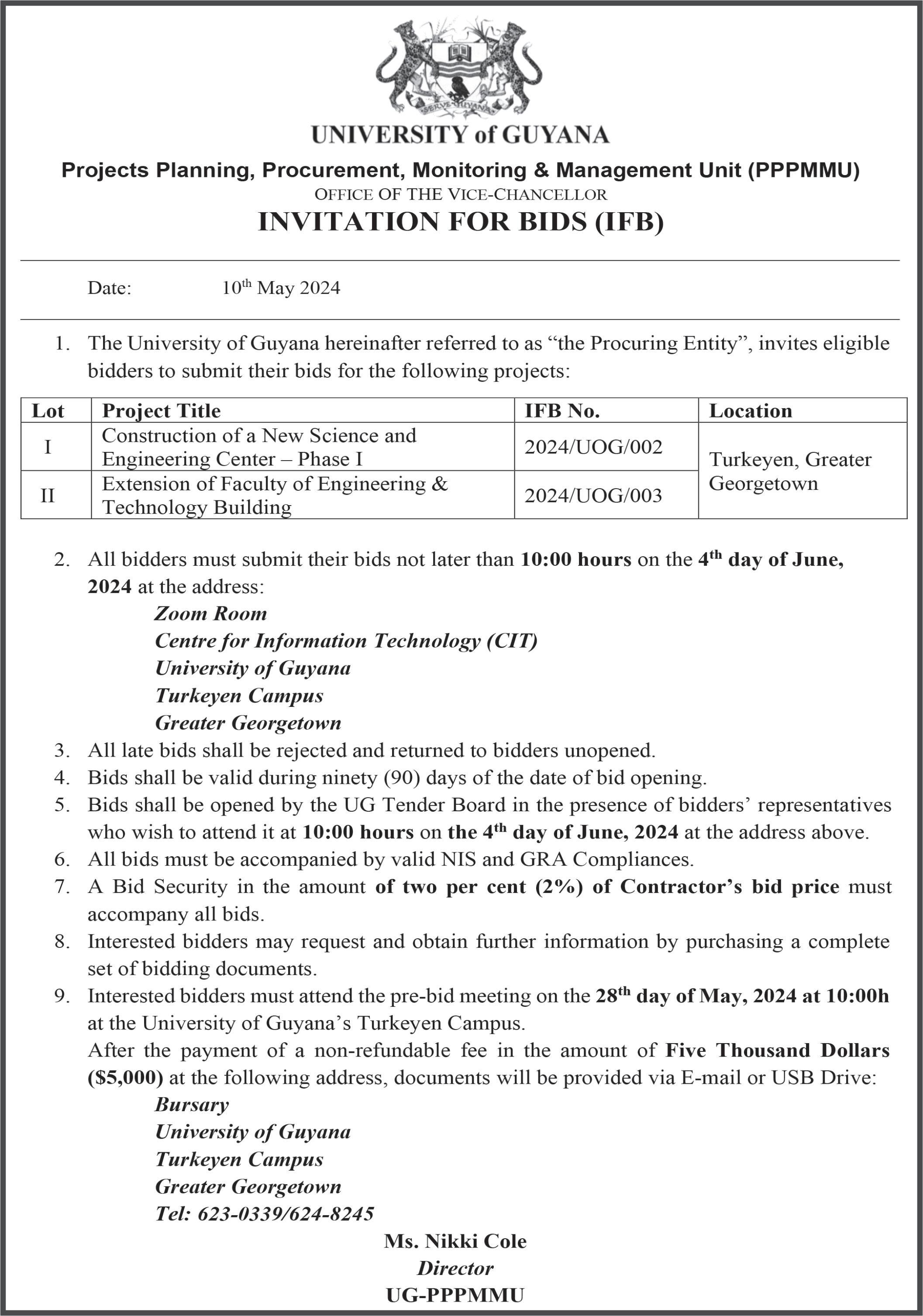
IN the Anglophone Caribbean, especially among younger people, Haiti is regarded as a country that happens to be geographically in the West Indies but is very different from the Anglophones. Indeed, the stereotype of Haiti is an adoption of the North American, that is, it is the most impoverished country in the world with a semi-barbarous population whose religion is witchcraft with a slight overlay of Catholicism and which has never had a stable

and non-corrupt government and administration. This stereotype belongs to the latter half of the 19th and 20th centuries. Before that time, Haiti was regarded as the richest European colony in the world, and in the 18th century, it supplied Europe with most of its sugar. Its planter class were rich, and many of them were cultured, and its system of slavery was not as harsh as in other parts of the Caribbean. Indeed, many plantations were owned by ‘Mulattoes’.
Haiti’s decline began with the Haitian Revolution. In the 1790s, the slaves in Haiti rebelled and successfully defeated the French administration, establishing the second independent state in the Americas after the United States. The Revolution was led by talented leaders such as Toussaint L’Overture and Petion.
France, the defeated colonial power, took whatever measures it could to destabilise the new republic both economically and politically, prevented the export of Haitian agricultural products and succeeded in having a cordon sanitaire around Haiti. In such circumstances, Haiti fell into a tailspin of decline, which we see today.
It should be observed that up to the 19th century, both the Spanish and English-speaking Caribbean regarded Haiti as a brother Caribbean country, and this was manifested when the French planter class left Haiti after the Revolution and settled in various Caribbean countries where they were welcomed and integrated.
In Trinidad, for example, French Creoles became an important class in every field of endeavour - in business, in the arts and even in politics. CARICOM, led by Guyana, is reestablishing that sense of brotherhood, and this is seen in the part CARICOM is playing in endeavouring to help Haiti emerge from its present “ failed state” syndrome.
Criminal gangs have always been a part of Haitian life, but they were always small and never impinged on the mainstream of Haitian life. In February, however, after the assassination of President Jovenal Moise, the gangs grew in number and size and purported to attach a political agenda to their aims and by March 2024, they were in control of 80 per cent of the capital Port-au-Prince. They opened the jails, burnt the pharmacies, terrorised hospital staff, and prevented the movement of food, causing famine among millions, with
children suffering the most. All essential services had collapsed, and the Prime Minister Ariel Henry, who had gone to Kenya in connection with having a Kenyan Peacekeeping Force, was stranded in Puerto Rico because the airports were closed. Haiti was in chaos.
CARICOM, UN Secretary General Guterres and Haitian counterparts, especially the latter, have established the Presidential Transitional Council (CPT), which will put in place transitional governance arrangements and have appointed an interim Prime Minister and a Provisional Electoral Council. They will urgently address the security situation regarding the population’s access to food, water, and medical services and ensure that children can return to school. Through this positive involvement in Haiti, CARICOM countries have drawn closer to Haiti and now truly feel it to be part of the Caribbean fraternity. This is emphasised in CARICOM’s final statement: “CARICOM is reminded of the commitments made by the Transitional Presidential Council and stands ready to support them and the Haitian people in their efforts to put Haiti back on the road to constitutional and democratic legitimacy, stability and sovereignty and to ensure the proper functioning of the State’s institutions.”
It is expected that by the end of 2025, almost full normalcy would have returned to Haiti, and the country would have been able to embark on a path of social, economic, and political development. There is now more optimism about this new beginning coming to fruition since other countries are interested and committed to supporting Haiti, and among them are the CARICOM territories. Guyana, for example, may be able to project elements of its agricultural revolution to uplift Haitian agriculture. FROM PAGE XVIII



said and looked at Ramesh, a mixture of pity and admiration in her eyes and said quietly, “You ah wan brave man.”
He nodded a little, trying to hide his disappointment and thanked her parents for their time. Shanti walked him to the gate, and he said something to her that came truly from his heart.
“Ah was hoping ah could help yuh find yuh dream.” She had smiled then, though with some doubt in her eyes, but a smile that gave him hope.
“Ah didn’t know you like me,” she said.
“Ah had neva really put too much thought tuh it,” he confessed, “But when ah did, ah recognise there is something special bout you…” he paused, looking her in the eyes, “Something ah want in meh life.”
Those words touched her, but she said with a tinge of regret, “Ah don’t know wuh tuh say.”
“Dat’s okay,” he had responded with a casual smile, “Ah will wait till yuh do.”
Six months later, she said ‘Yes’ to his proposal. She had put her trust in him and believed that he would give her a better life, and he continued to work hard.
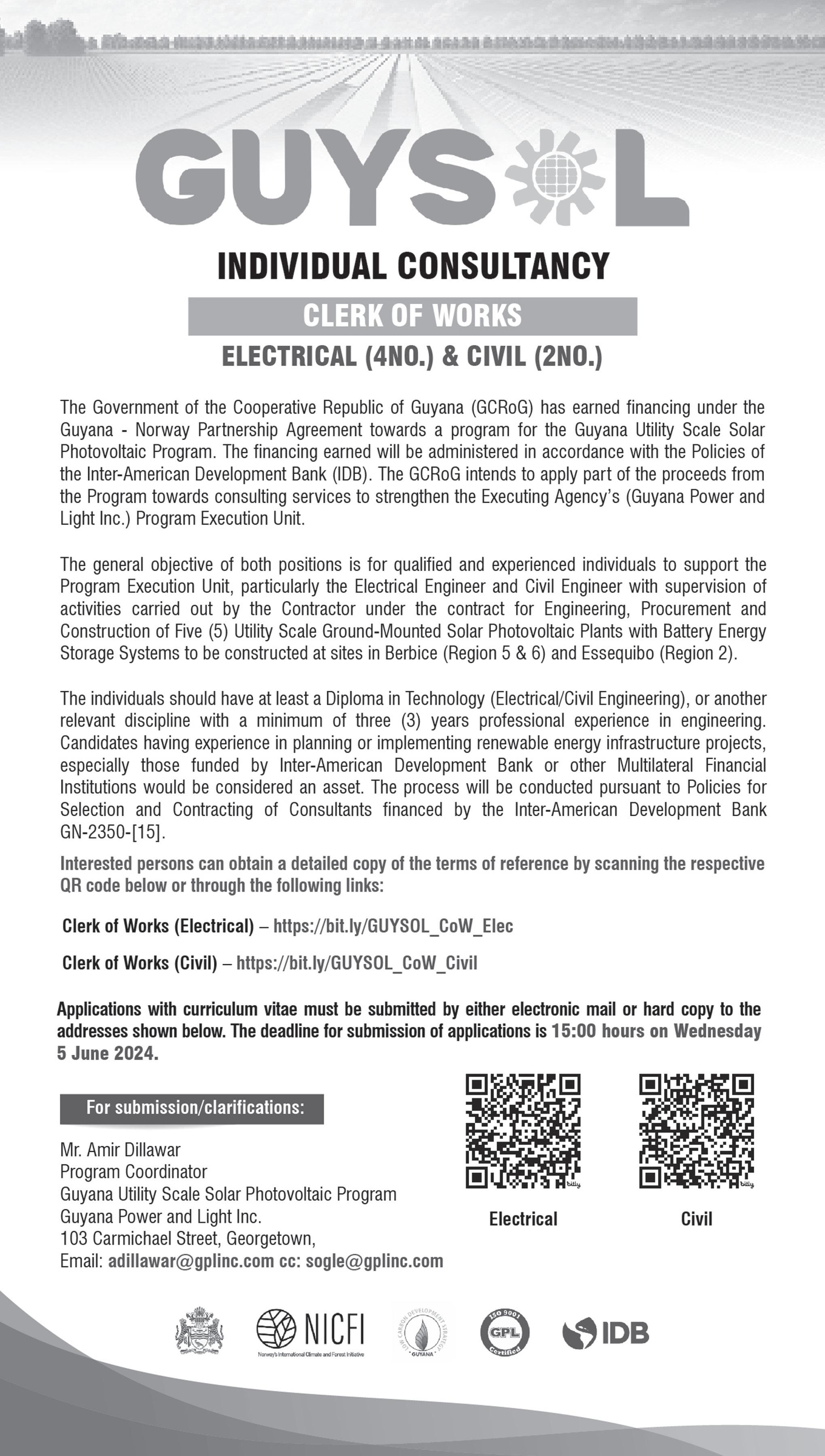
There were setbacks sometimes along the way but she never gave up on him. She continued her food business but not to ride her bike door to door and sell, but instead took orders from bigger customers for pick-up or delivery.
Their first son was born two years after they got married, and though Ramesh sometimes worked different jobs when his boat was docked for repairs, his mind was still on fishing, for it was a bloodline. Sometimes at night, when he was far from home, he could hear the whisper of the sea.
He had planned to sell the old boat and invest in a trawler, but he hadn’t solid financial earnings enough for the bank to give him a loan. He knew the money he was trying to save would take too long.
By the time his daughter was born, he still had not saved enough and with two children now to provide for and other home expenses that included costly medical bills, things were not looking good. Shanti did not complain, but he could see that it was taking a toll on her. After some serious thinking, he decided to take a step to ease his financial woes.
One early morning, he joined a bus to Georgetown to seek his brother Naresh’s help, his mind in doubt along the way.
Ramesh reached Bel Air Park and looked stunned at his brother’s splendid mansion with marble driveways, luxury vehicles and armed guards.
“All ah dis while his oldest brother deh struggling tuh survive?” Ramesh bemoaned.
He spoke to the security guard in the hut, requesting to see the businessman, but he just gave his name and village, not the relation. He was told to wait, and one hour later, he was called in.
Naresh was on a phone call and signalled him to sit, not a welcoming smile, just a curious look on his face. He put the phone down after a short while and asked in a casual manner, “So what brings you here?”
Ramesh smiled a little, happy to see his brother but hurt by his indifferent attitude.
“Not ah how you doing brother …?”
“I’m a very busy man,” Naresh stated, “As though the man sitting in front of him was a stranger, “I don’t have time for sentiments.”
“Well, ah will juss get tuh de point den,” Ramesh said, and he told him about his plan to buy a trawler but did not have enough savings for the bank to give him a loan. Naresh looked at him expressionless for a moment then said, “I left a poor life and worked hard to gain the success I have but you, it seems, haven’t done much.”
Ramesh did not say anything for his brother seemed to have forgotten that he had helped build the foundation that gave him a good start in life. He just said, “Maybe we struggles and sacrifices are different.”
“That’s a poor excuse, but I would help you now, just don’t make it a habit to come asking for help. I have worked hard for what I have and I can’t always be giving charity.”
“Charity?”
The word hit Ramesh like a heavy blow to the abdomen.
“Am yuh brotha and ah ask yuh fuh some help fuh de first time and dat’s charity?”
“You should be thankful,” Naresh said, with a hint of arrogance in his confident outlook as he took out his chequebook. He wrote a cheque and pushed it to Ramesh.
“I have a business meeting in ten minutes so I really can’t talk more with you.”
“Even though we ain’t see each other suh lang?”
“Like I said, I’m a busy man,” he said dismissively.
Ramesh smiled wryly as he looked at his wealthy brother, the boy who cried because he hadn’t books for school, and cried for a new bike and new shoes that his eldest brother tried his best to give him.
Ramesh took a deep breath and stood up without taking the cheque.
“Ah guess it was wrong ah me to ask fuh yuh help and am sorry fuh tekin up a few minutes ah yuh time.”
He walked out of his brother’s office so hurt, he felt suffocated by the pain. He stood at the gate for a moment and inhaled deeply, then he walked the long stretch of road to the highway to get a bus back home. As he stood in the hot sun, his breathing, a little uneven, tears filled his eyes, a man who had never cried before.
“Me own brotha turn his back on me. Who can ah ask fuh help now?”
be continued…





SOMETIMES in life we take things for granted. We often overlook the small details and necessities for a healthy lifestyle. This includes things like sleep and getting enough rest every day. Unfortunately, we live in such a fast-paced world, and everything relies on us being awake, alert and ready to be on the go for most of the day. With that in mind, we must be prepared for all that comes with a hectic and unpredictable










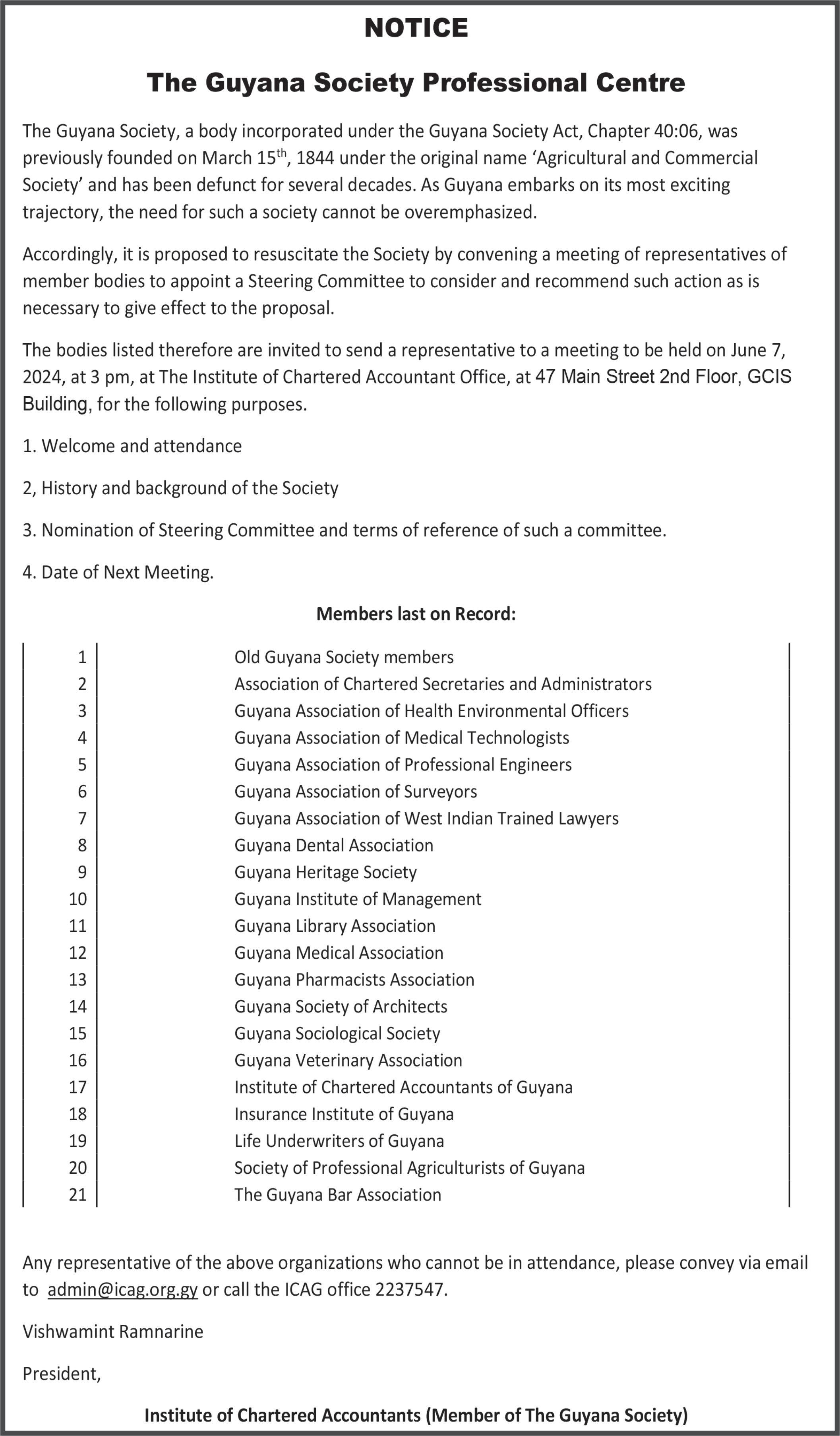
FROM PAGE XXII
function effectively with the amount of sleep we get, but we should. While sleep is a human necessity, it may not always be natural for each of us to do.
It’s not always as simple as putting your head on your pillows, closing your eyes and dozing off. Some people suffer from sleep disorders or disturbances. They can be described as people having problems or difficulties with their sleep quality, amount, or timing. Problems with sleep can be linked to health issues, which can be either physical or mental. Certain physical ailments like diabetes can be linked to sleep disturbances and certain mental health conditions such as depression can also be linked to sleep disturbances. According to the National Sleep Foundation (US), a human needs 7-9 hours of sleep daily. Without enough sleep, we

can also have even more difficulties in our daytime routines.
The lack of sleep can alter your mood, affect your ability to make decisions, affect your ability to perform at work or home or even contribute to the detriment of your health (physical or mental). Most people are familiar with insomnia because it is perhaps the most common form of sleep disturbance. However, it is not the only type of sleep disturbance. Insomnia is an ongoing issue with falling asleep or remaining asleep. There is also sleep apnea. This can be described as a breathing disorder that can disrupt the flow of breathing during sleep. This can be pinpointed when people snore loudly in their sleep or when they wake up feeling choked or suffocated. Another common type of sleep disturbance is narcolepsy. This is when a person still feels very tired even after getting full sleep. They can also have random “sleep attacks” during the day.
I shared these few examples so you can understand that the topic is wide. There’s not a one-size-fits-all approach. However, the best thing you can do is to seek professional medical help. You can also try personal care options such as using melatonin supplements, making better dietary choices such as limiting sugar intake, creating a good sleep environment or even doing breathing exercises. I hope this article helps you to understand that the lack of sleep should not be romanticized. Our body cannot function without it, and if you notice that you have a sleep disturbance, seek the help you need so you can start “catching Zzz’s” and maintain a healthier lifestyle.

FROM PAGE II operation. Luke’s wines include coffee, jamoon, capadulla, red oman, mixed, cherry, and passion fruit, which all derive from locally grown fruits.
In some of his newest products, he has passion fruit essence, powered passion fruit, cherry-flavoured pepper sauce, cassava powder, cassava cassareep powder, and cassava

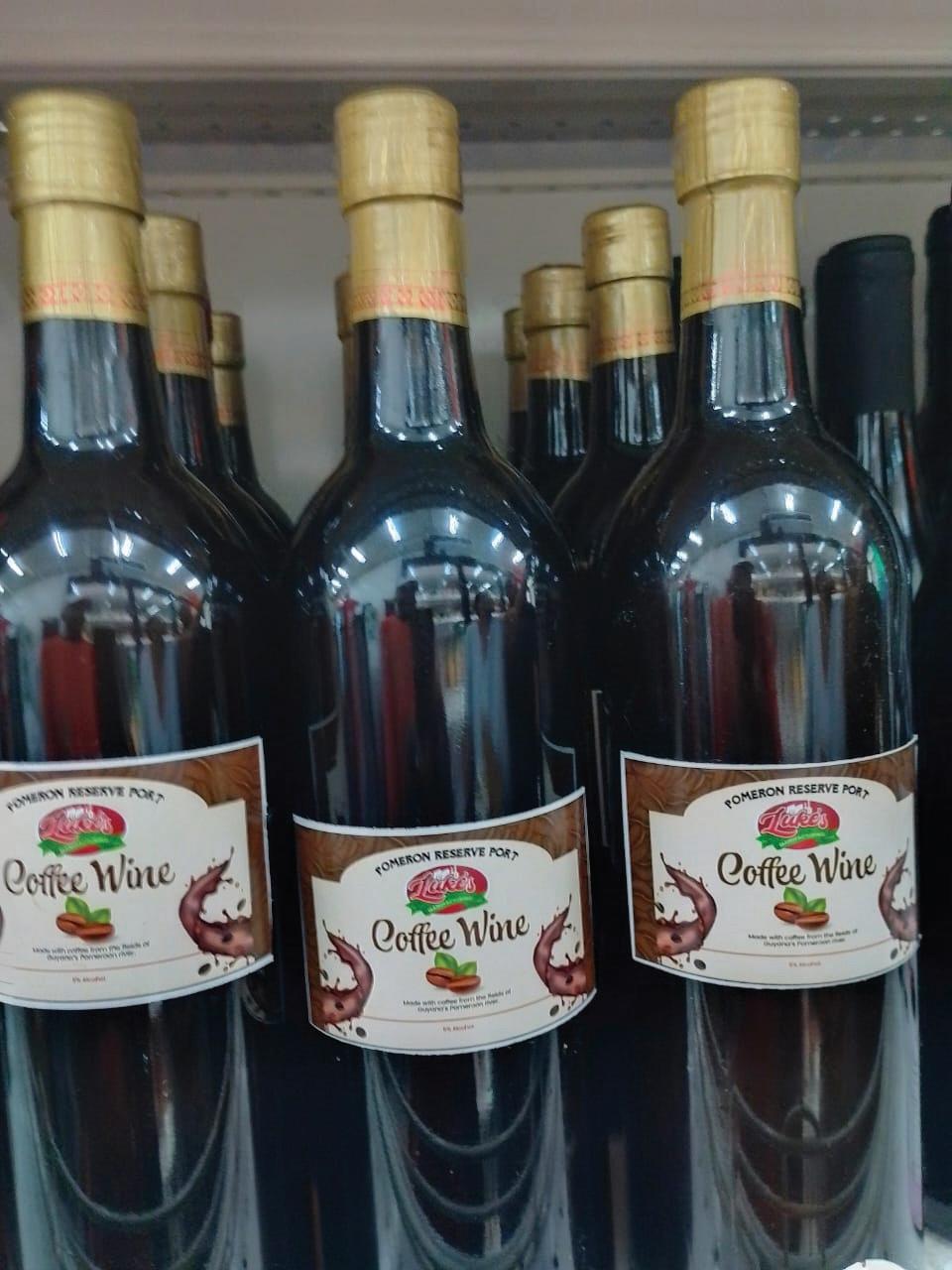
seasoning, which add flavour to the pot.
Luke explained that he was a full-time chef with a big company catering to hundreds of staffers, and whenever he wanted time off, he couldn’t get it without lying. That got him thinking as a staunch Christian; he knew it was not good and a change was necessary, so he started his own small business.
He told the Pepperpot Magazine that he had to get out of that and start his own small business because working
with big companies was not worth it.
Luke explained that where he is living had jamoon in abundance, and he thought of a way to use it.
He began making jamoon wine in a 45-gallon container, which came out well. He shared it as gift samples to people around him, and they encouraged him to make it into a business since it was good enough to market.
“Once I get the factory up and running, it is guaranteed I will be producing a lot more newer products since all my products are local and all-natural [organic] with no additives or artificial flavours,” he said.
Luke reported that he is re-branding his products and only five of his products have been branded “Made in Guyana” so far. He is also re-packaging to make them more attractive.
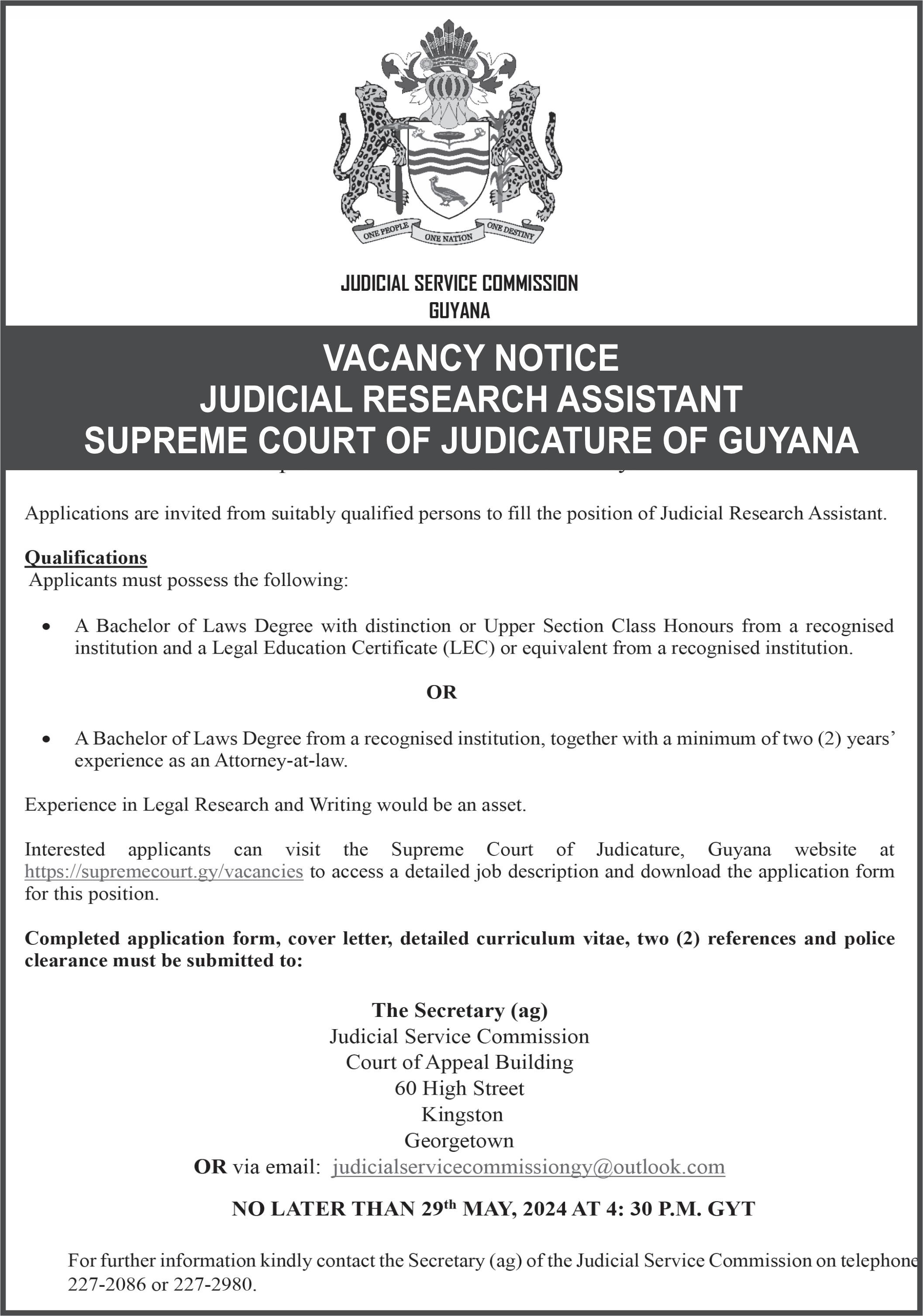

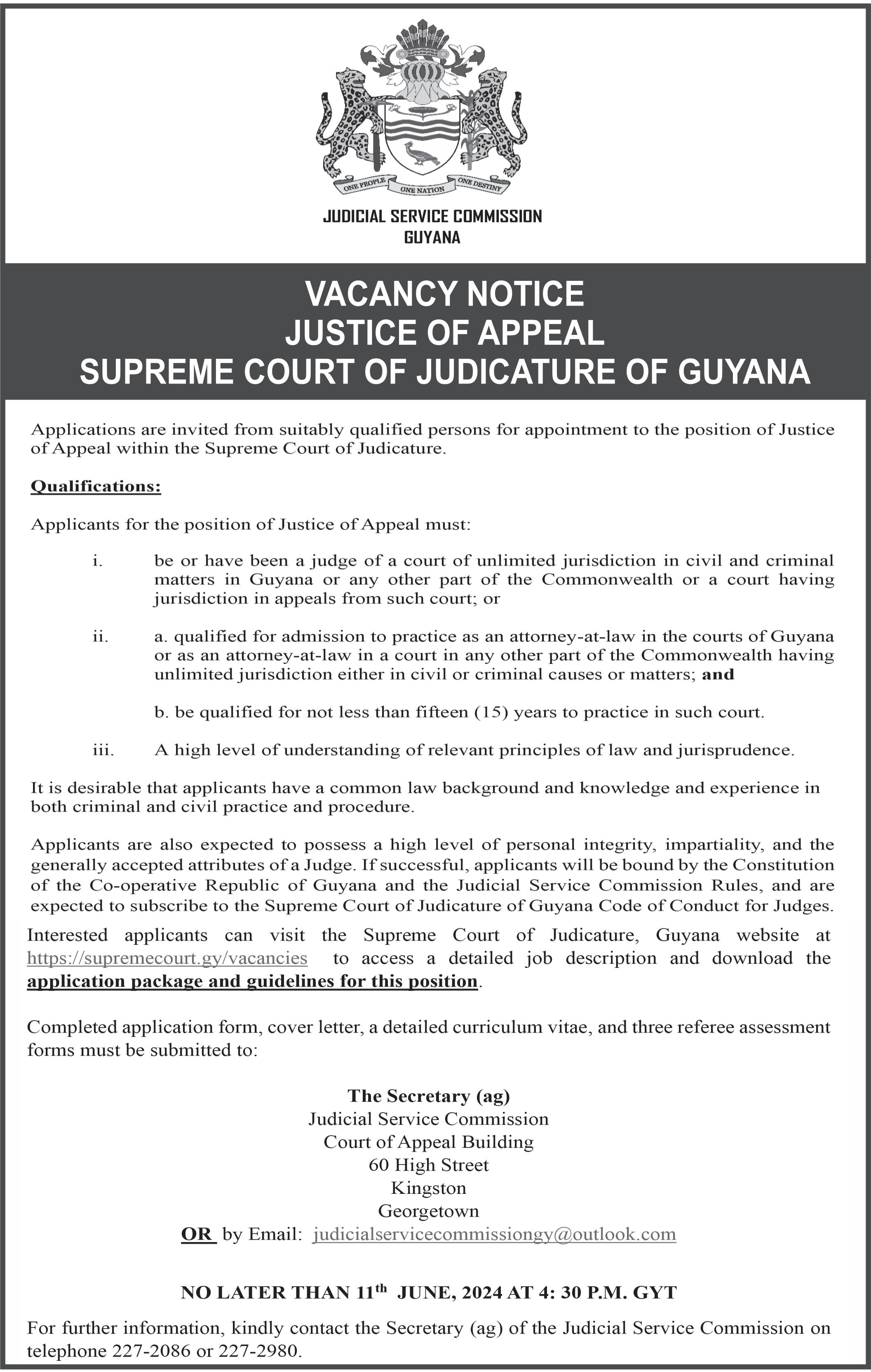




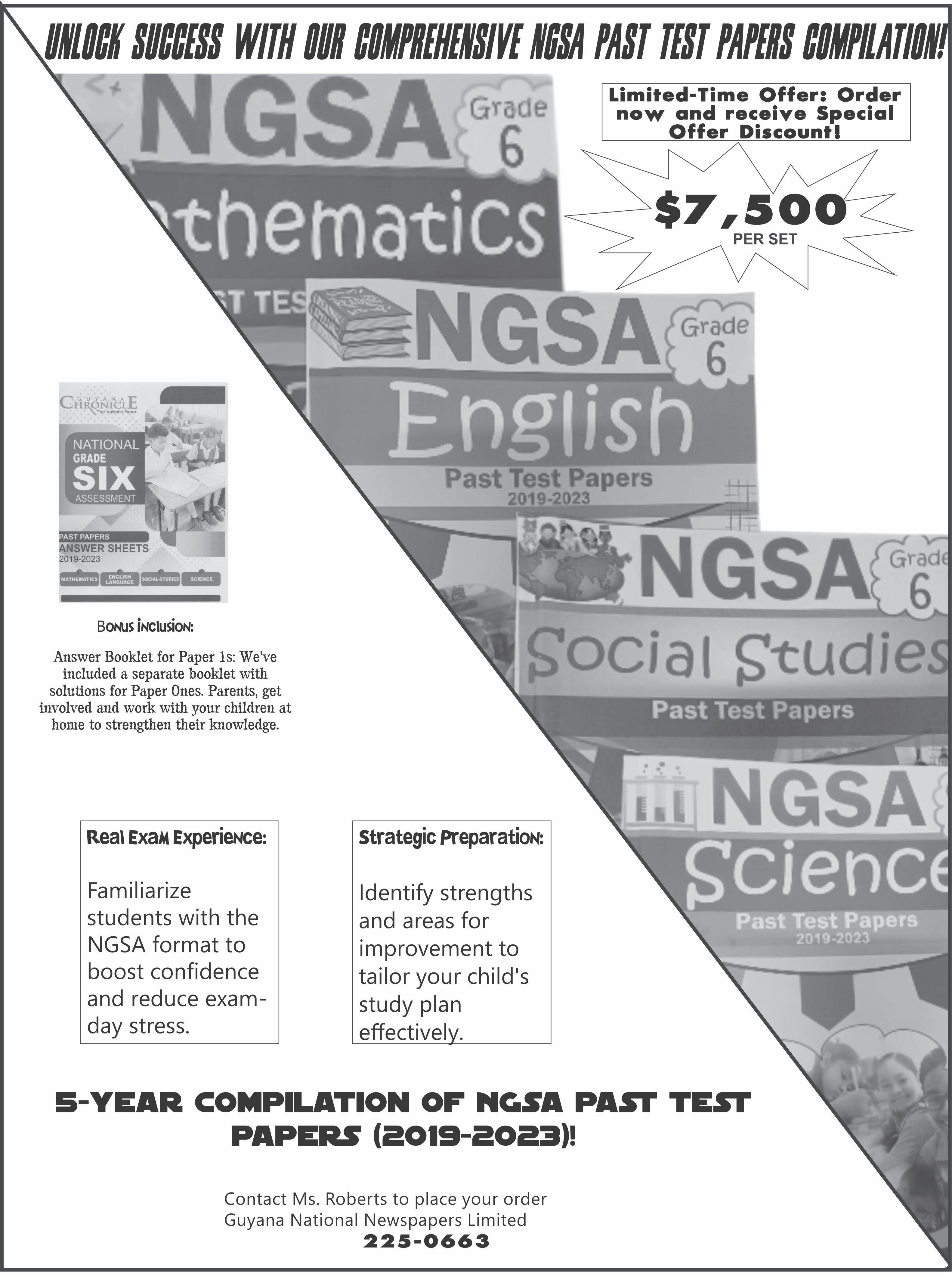










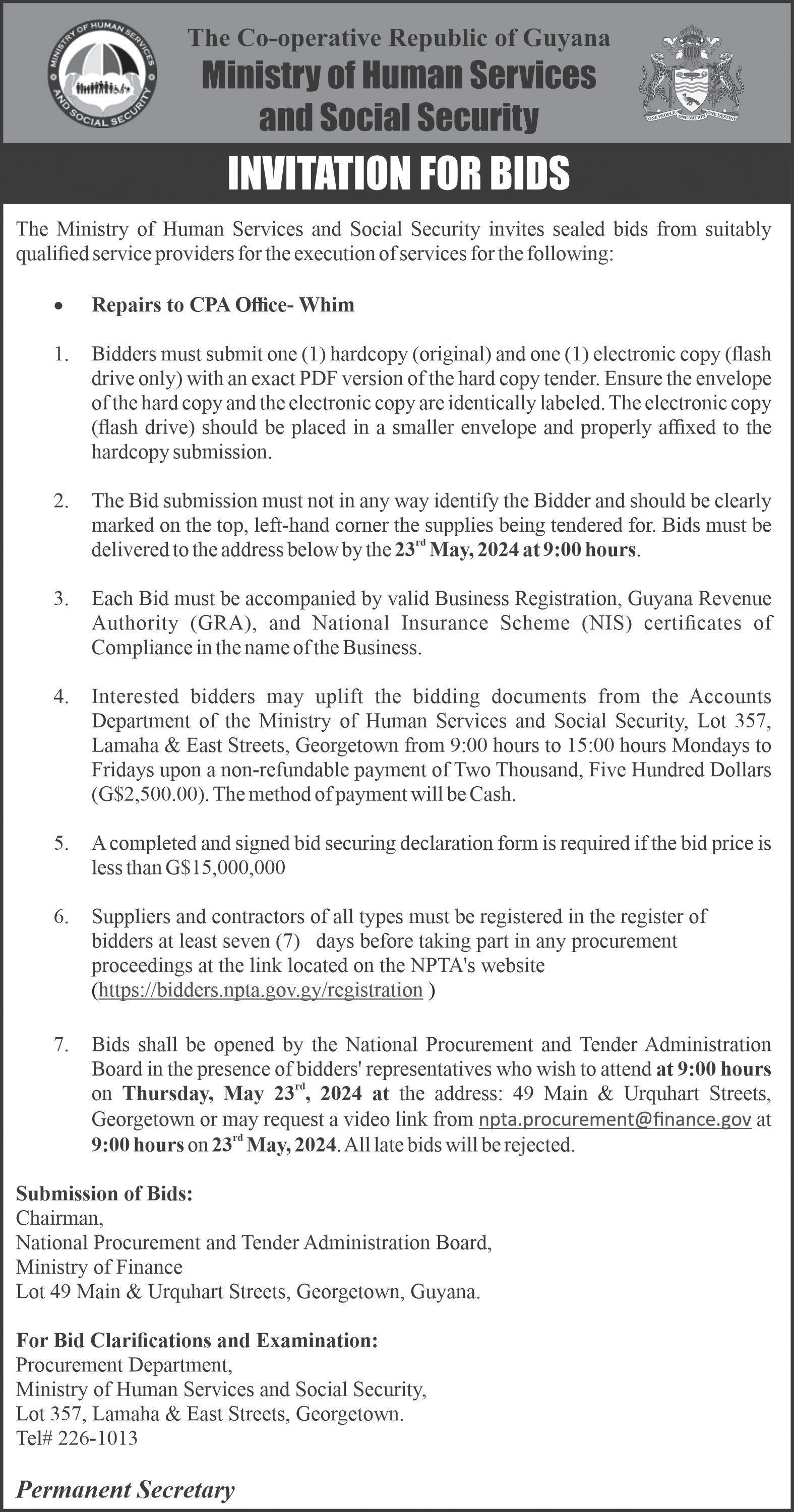
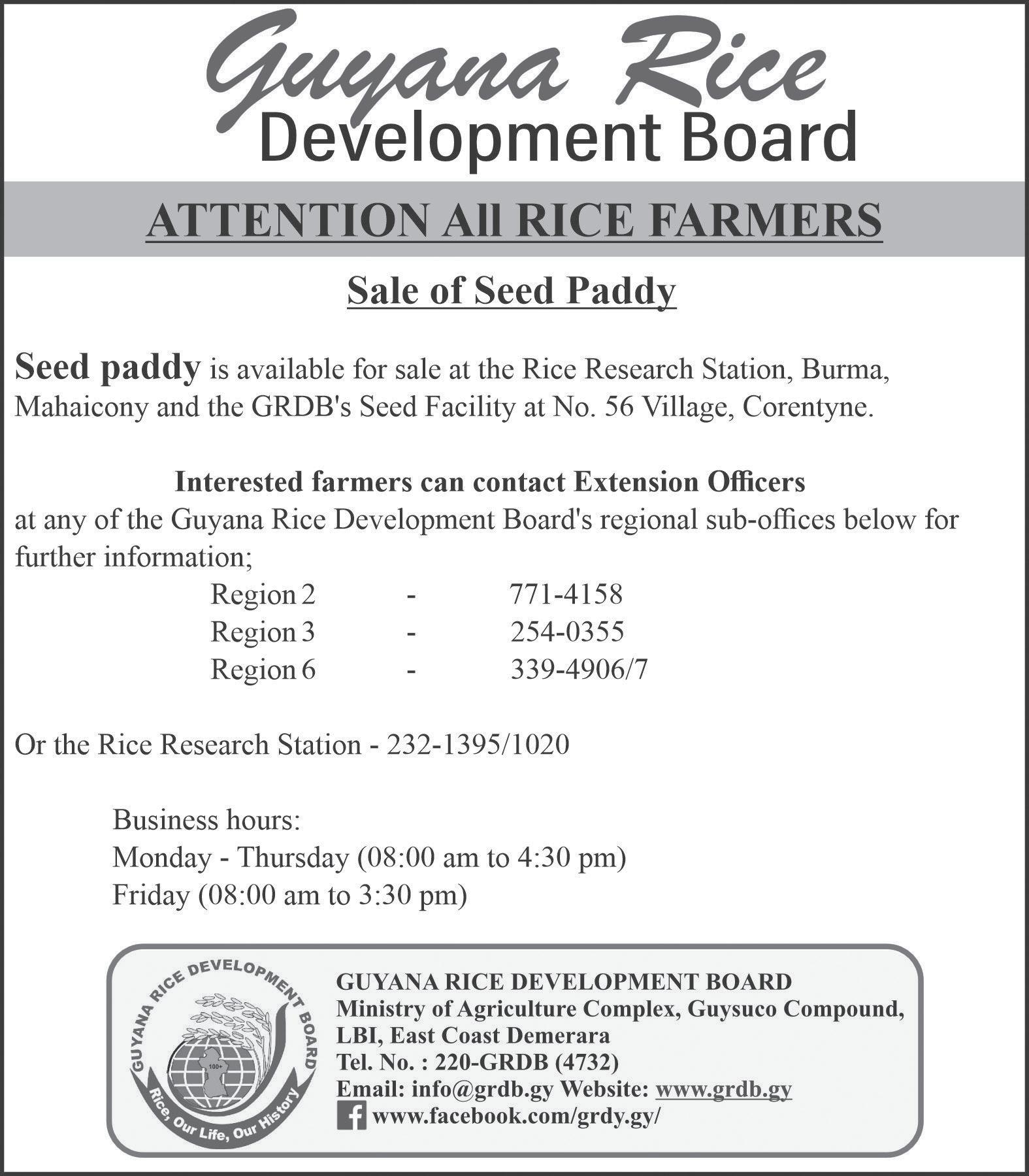





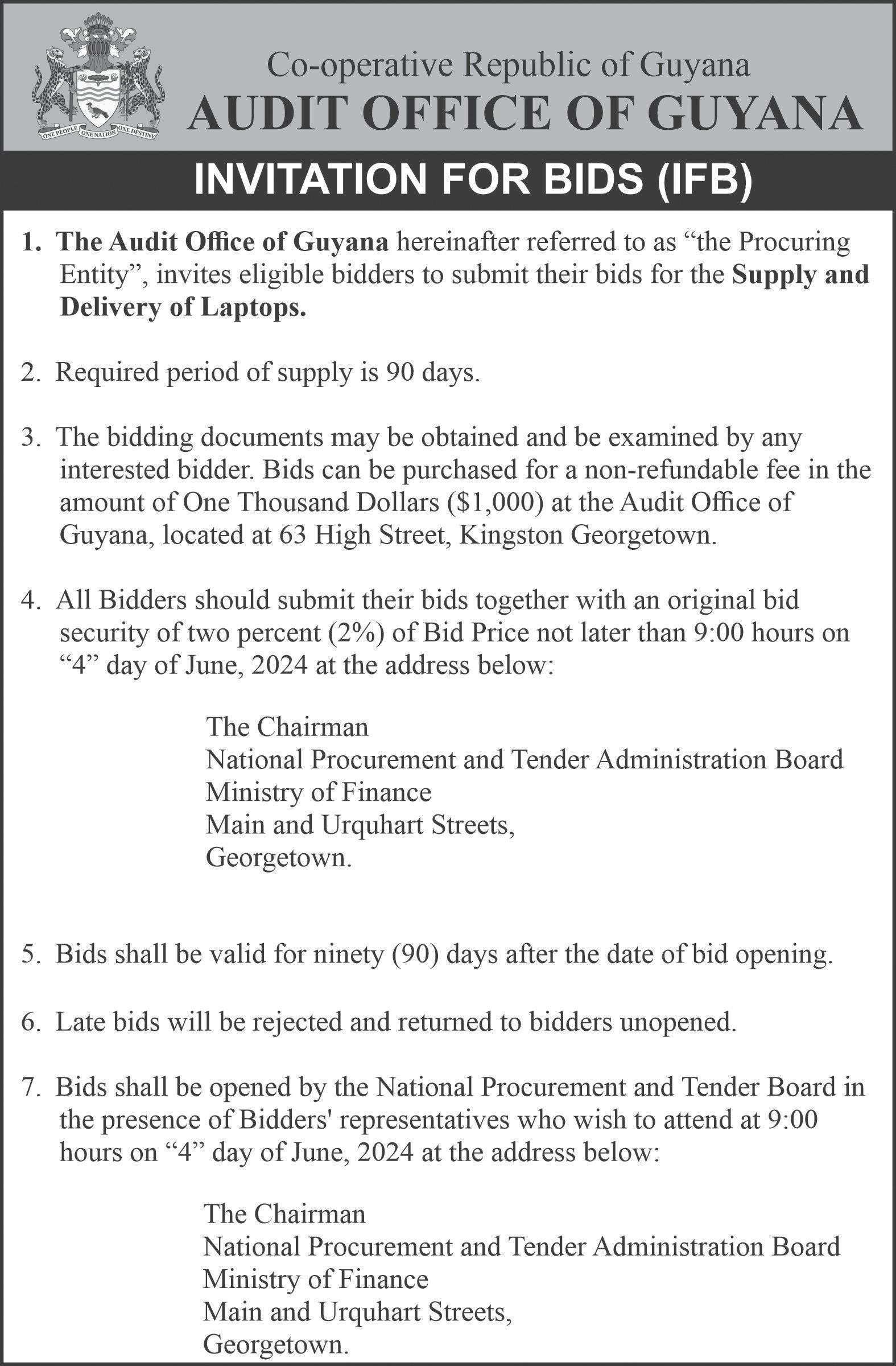




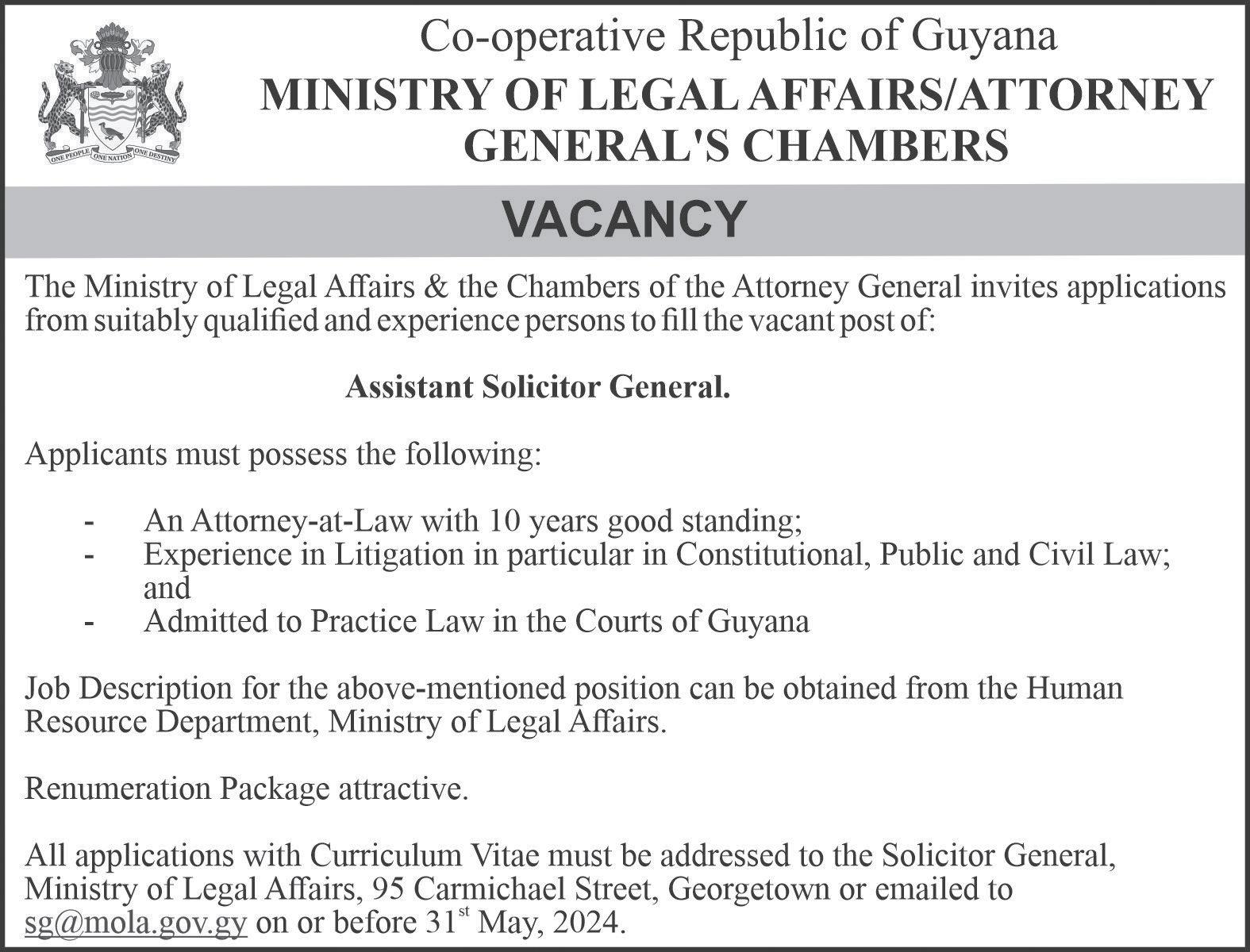
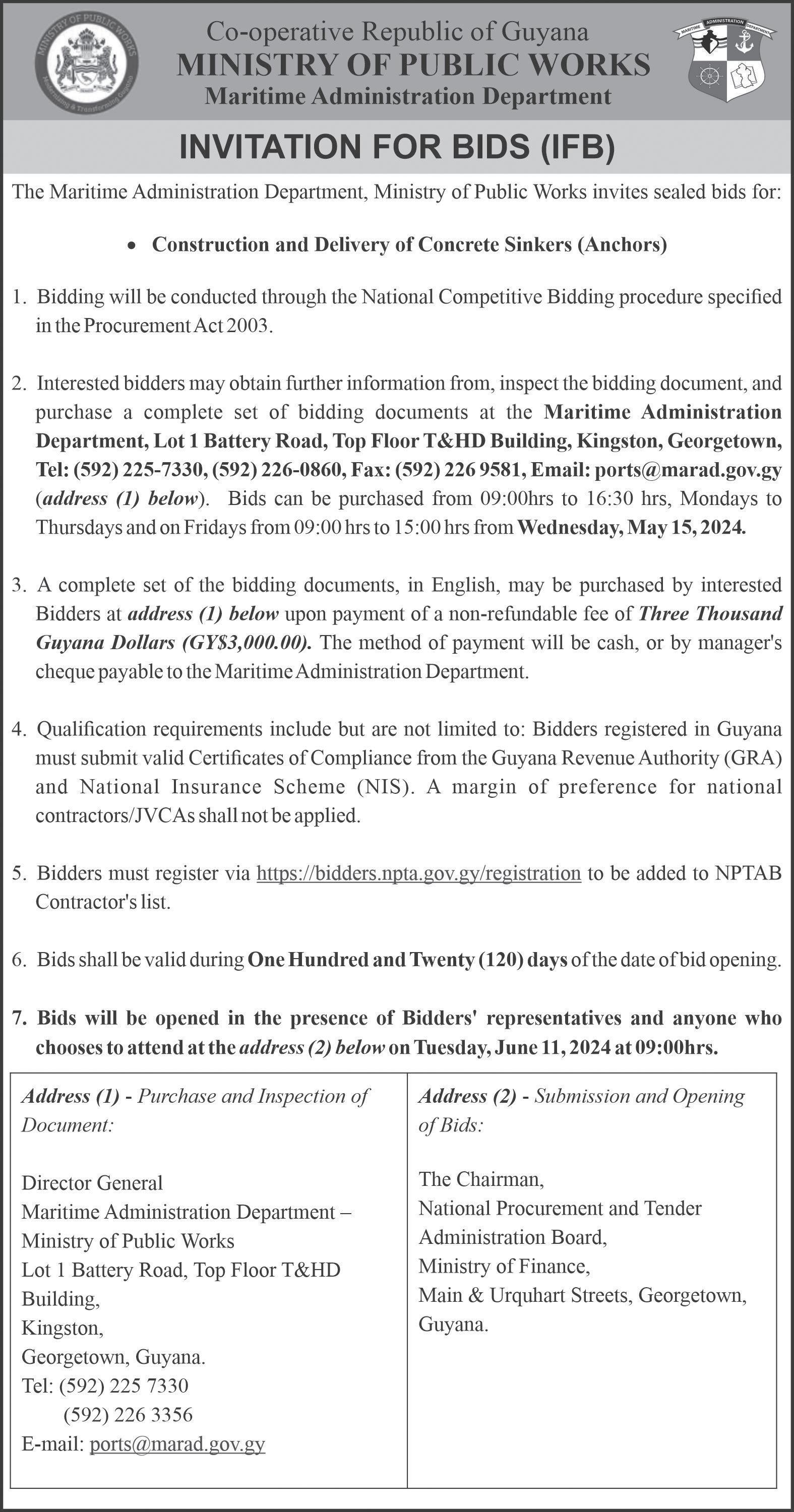










The dogma of the Ghost in the machine.GILBERT RYLE (1900-1976) The Concept of Mind (1949), pas- sim
Dear Student,
Welcome dear friend. To show an understanding of the organisation of a discursive or lengthy passage, you must get involved with some noteworthy reading skills. First, study closely the whole passage to arrive at its organisation or framework. That

done, move to grasp the relations between parts of the passage. Then, identify the link-words or indicators that introduce the different parts or arguments. This approach can help you respond with a frame, linkwords, or a diagram. Be wise.
Love you.
Word or phrase closest to OPPOSITE in meaning to an underlined word or phrase
Note: A word or phrase that is closest to OPPOSITE in meaning to another is one that does not have the same or very close meaning to the original word or phrase.
Instructions: Choose the word or phrase that is closest to OPPOSITE in meaning to the word or phrase in brackets.
1. Their actions showed that they were firm in their (rejection) of the new law.
(A) ignorance (B) acceptance (C) application (D) understanding
2. The distinguished actor tried to (avoid) the press whenever he was on holiday.
(A) attack (B) praise (C) contact (D) interview
3. Phillip’s attitude toward the academic subjects taught at school was one of (indifference).
(A) enthusiasm (B) hostility (C) boredom (D) amusement
4. Being helpful and friendly is (characteristic of) most country folk.
(A) unworthy of (B) uncommon in (C) unnecessary for (D) unreasonable of
5. The manager decided to inform the staff about all (complaints) received from customers.
(A) demands (B) requests (C) suggestions (D) complaints
Comparison and contrast
The skills of comparing and contrasting will help you become a better reader. One strategy for comparing is to identify the character’s perspective or his understanding of the world.
As you read, complete a graphic organiser. It allows you to apply an understanding of literary elements and styles, and to grasp details about the story’s main character. You can see whether his actions, emotions, and ideas are similar or different from those around him. You can decide also whether to trust what the characters say.
Answer the questions below this passage.
Simeon sighed and tapped his fingers on the library table. “Great,” he thought, “I gave up my Saturday to teach some loser to read, and he doesn’t even show up.
How can the middle school force us to do volunteer work anyway? It’s not fair.”
Just then an older man in greasy overalls rushed toward him. “I am sorry. I just got off work and the bus was late. I am Jonathan, and you will be my teacher! he said in excitement. Jonathan said that he was a car mechanic who had fled to America from a war-torn country to start a new life. “I am a good mechanic, but the cars here are so new, I must learn to read English so I can learn about them and keep my job. Can you help me?”
Simeon grinned. If there was one thing he loved and knew about, it was cars. “You bet,” he said, leading Jonathan to a shelf of books about cars.
1. Which of the following details is correct?
(A) Jonathan wanted to be at the library.
(B) Simeon wanted to be at the library.
(C) Both characters wanted to be at the library.
(D) Neither character wanted to be at the library.
2. How is Simeon’s attitude before the meeting different from Jonathan’s?
(A) Simeon is scared, but Jonathan is confident.
(B) Simeon is confident, but Jonathan is scared.
(C) Simeon is resentful, but Jonathan is excited.
(D) Simeon is excited, but Jonathan is resentful.
3. Which aspects of the description show the greatest contrast between Simeon and Jonathan?
(A) interests and hobbies (B) ages and past experiences
(C) intelligence and talent (D) clothing and hairstyles
4. Which statement accurately describes a way in which Simeon and Jonathan are similar?
(A) They both hate reading. (B) They both hate meeting new people.
(C) They both like books. (D) They both like cars.
5. Which statement accurately reflects the information in the passage?
(A) There are evident similarities between the characters.
(B) There are no similarities that are evident between the characters…
(C) It would be difficult to contrast the characters.
(D) It would be impossible to compare the characters.
Choose the correct answer to each question.
1. Which word is closest in meaning to ‘similar’?
(A) alike (B) simple (C) different (D) complicated
2. Which phrase is closest in meaning to ‘spectacular’?
(A) something that is worth looking at (B) someone who questions (C) something that is hard to understand
(D) something that is different from others in its group
3. Which phrase is closest in meaning to ‘differentiate’?
(A) find or show characteristics
(B) find or show similarities (C) find or show nuances
(D) find or show differences
4. Which is the closest in meaning to ‘different’?
(A) look like (B) not alike (C) alike (D) look different
5. Which is the correct definition of ‘simultaneous’?
(A) happening at the same time (B) happening one after another
(C) happening to different people (D) happening to several people

I AM often surprised by how many people still believe in falsehoods associated with dentistry. In fact, dental myths remain one of the greatest roadblocks to achieving good oral health.
These misconceptions promote behaviours that can be detrimental to the health of teeth, gums and oral tissue. Because myths need to be replaced with facts to ensure the deliverance of appropriate oral care, an attempt is being made here to dispel some of the more common falsehoods.
Myth. Most children get cavities.
Regardless of age, cavities may occur whenever plaque, bacteria and sugar are present together in the mouth for more than 48 hours. Children usually develop cavities between the teeth and on the chewing surfaces. The elderly are especially prone to developing cavities on exposed root surfaces and around old fillings.
Myth. Cavities do not affect overall health. If cavities are left untreated, decay will spread into the pulp (nerve) of the tooth, causing an infection. Any infection can spread through the bloodstream to other parts of the body. If the brain becomes involved, death can result. In fact, nine different conditions originating from dental abscesses are known to be fatal. Therefore, cavities indeed can have harmful effects on overall health.
Myth. A toothbrush with hard bristles cleans teeth better than one with soft bristles.
Using a toothbrush with hard bristles over a long time damages the teeth by removing the tooth’s surface. Brushing exposed roots with hard bristles causes serious damage over a shorter period because roots do not have a hard protective covering of enamel. Using a hard bristle on gums can damage the tissue and cause them to recede.
Myth. Plaque can be removed effectively by brushing. It is not possible to clean the surfaces between the teeth when brushing. So, brushing alone cannot guarantee that your teeth will not decay. The teeth should be flossed to completely remove plaque from all surfaces. Plaque is associated with tooth decay and gum disease. If not removed daily, plaque can harden into calculus. This rough cement-like substance must then be removed professionally by a dentist or dental nurse.
Myth. Denture wearers do not need dental checkups. No denture fit is permanent. Over time, changes occur in the bone and soft tissues in the mouth. This affects the way a denture fits. To ensure continued proper fit, the denture wearer should have a dental exam at least once a year so that necessary adjustments can be made. This yearly examination will also help alert the dentist to any signs of oral cancer.
Myth. Dentures should always be worn. Dentures should be removed at least six hours every day. This allows the tissues to rest and relieves the gums from the pressure of the denture. Excessive pressure can cause the supporting tissues of the denture to shrink. Dentures should be kept in water when they are not in the mouth so they do not warp.
Myth. Denture “fit” problems can be resolved by using denture adhesives and home denture reliners. If large amounts of adhesives are needed to retain a denture, the denture should be adjusted. A proper fit can only be obtained if the dentures are professionally relined. Wearing poorly fitted dentures can damage the bone and soft tissues, increase infection and expose the wearer to oral cancer.
Myth. A toothache suggests that the tooth in question needs to be extracted.
